Patriarch Kyrill und Kardinal Erdö für mehr Druck auf Ägypten
see also (in German): Christliche Verantwortung in der Welt - zu Politik und Krieg
Patriarch Kyrill und Kardinal Erdö für mehr Druck auf Ägypten
Ägypten: "Kirche in Not" warnt vor "Christenvertreibung"
Ägyptische Vatikan-Botschafterin: Papstappell findet Gehör
13.10.2011
Vatikanstadt, 13.10.2011 (KAP) Der Appell von
Papst Benedikt XVI. zum Schutz der christlichen Minderheit in Ägypten wird
nach Einschätzung der ägyptischen Botschafterin beim Heiligen Stuhl, Lamia Aly
Hamada Mekhemar, Gehör finden. Wie Radio Vatikan am Donnerstag berichtete, hob
die Diplomatin in Rom zugleich hervor, dass sich die Gewalt am Sonntagabend in
Kairo nicht ausdrücklich gegen Christen gerichtet habe.
Neben vielen Kopten, die wegen der Zerstörung einer Kirche demonstriert
hätten, seien auch Muslime ums Leben gekommen, die für die Rechte von Christen
auf die Straße gegangen seien, sagte die Botschafterin. Sie räumte ein, dass
das ägyptische Gesetz für Christen und Muslime zwar dieselben Rechte vorsehe,
diese jedoch in der Praxis nicht gleichermaßen beachtet würden.
Kopten: Schönborn nimmt Politik in die Verantwortung
Ägypten: Muslim-Extremisten brennen neue koptische Kirche nieder
Wien-Kairo, 03.10.2011 (KAP) ...Am Freitag war
in 20 Moscheen in der Region gegen den Wiederaufbau der Georgskirche und
gegen die Kopten im Allgemeinen gepredigt worden.
Augenzeugenberichten zufolge zogen nach den Freitagsgebeten insgesamt mehr
als 2.500 Salafisten nach Mirinab. Zunächst seien Häuser, Geschäfte, Autos
und Felder der Kopten geplündert und zerstört worden. Die Kopten hätten sich
mit ihren Familien auf der Nil-Fähre über den Fluss in Sicherheit gebracht.
Schließlich hätten sich die Salafisten der Georgskirche zugewandt. Als
erstes sei das Pfarrbüro gestürmt und angezündet worden. "Ikonen und Bibeln
wurden auf die Straße geschleppt und mit Füßen getreten. Anschließend
begannen die Muslime die neugebaute Kirche einzureißen", so "Pro Oriente".
Praktisch seien die Kopten in Mirinab seit Anfang September von den
Salafisten "belagert" gewesen. Die Regierung habe zunächst eine
Heereseinheit in das Dorf entsandt, um die öffentliche Ordnung aufrecht zu
erhalten. Die Truppen seien aber vor 14 Tagen plötzlich abgezogen worden.
17.06.2011 23:17 Source: Седмица. Ru
Während der NATO-Luftangriffe wurde in Tripolis, der Hauptstadt Libyens,
die orthodoxe Kirche des Hl. GrossMartyrers GEORG geschaendet und gepluendert
In der Nacht vom Donnerstag auf Freitag, am 17. Juni 2011, haben unbekannte
Uebeltaeter die orthodoxe Kirche des Hl. GrossMartyrers GEORG des Orthodoxen
Patriarchats von Alexandria aufgebrochen, geschaendet und gepluendert.
informierten Аmen und Romfea.
Nachdem die Verbrecher die Tueren des Hauptportals aufgebrochen hatten,
schaendeten die die Reliquiare und pluenderten die Hl.Reliquien. Weiters geraubt
wurden das Altar-Evangelium, die eucharistischen Gefaesse und die silbernen
Lampaden vor den Ikonen, ebenso wie die Opferstoecke.
Die Polizei hat bisher noch keine Schuldigen gefunden.
![]() "...
I am not convinced ..." ODER ... entlarvte Lügen
"...
I am not convinced ..." ODER ... entlarvte Lügen![]()
Im letzten Monat konnten wir 2 Haltungen zur "Wahrnehmung internationaler Verantwortung" oder "mörderischer Interventionspolitik" vergleichen, in die sich Deutschland in den letzten Jahrzehnten verwickeln liess - und erst in der letzten Woche wieder 3 Menschen opferte.
Joschka Fischer (ex-Grünen-Vorsitzender und jetzt amerikanischer Honorarprofessor ohne Doktorat) stellte sein neuestes Buch vor, in dem er mit viel Stolz auf sein "... I am not convinced ..." verweist, dass er angeblich so mutig dem Kriegshetzer Rumsfeld entgegengeschleudert hat, bevor er die "Staatsbürger in Uniform" der deutschen Bundeswehr zur "Verteidigung Deutschlands am Hindukusch" der amerikanischen Weltherrschaftspolitik zur Verfügung stellte. Dieses widersprüchliche Verhalten begründet er dreisterweise damit, dass er so beweisen konnte, dass Er stark genug war, die "pazifistische" Grüne Partei zu einem "bündnisfähigen Partner" zu machen ...
Jürgen Todenhöfer (Bundestagsabgeordneter der CDU, stellvertretender Vorstandsvorsitzender des Burda-Konzerns) liefert in einem Essay in SPIEGEL 6 / 7.2.2011 die Argumente, die man sich von der Partei der Überzeugungsethik ("Schwerter zu Pflugscharen") erhofft hätte.
Bündnis-Reflexe wären vielleicht noch kurz nach dem 11. September zu verstehen, weil sogar Brandts Friedenspartei und Genschers Gewaltverzichtspartei uneingeschränkte Solidarität beweisen wollten. Aber damals war der Grüne an den Schalthebeln der Macht...
Und heute ?
Hoffnung auf einen Abzug der Amerikaner bis 2014.
...und das bei ZUNEHMEND MÖRDERISCHEN Aktionen beider Kriegsparteien in dem
geschundenen wehrlosen Land !
Noch vier Jahre ("un-convinced") Krieg - so lange wie der 1. Weltkrieg gedauert
hat ?
Was will die NATO in Afghanistan ?
Die Organisation der Zeit des Kalten Krieges, die es versäumt hat sich
ehrlicherweise rechtzeitig aufzulösen, hat es vielleicht notwendig ihre
Nützlichkeit als Kriegs-Instrument unsinniger Weltbeherrschungs-Interessen
zu beweisen.
Aber die deutsche Bundeswehr ?
Grundgesetzwidriger Umbau zur Interventionsarmee ?
Weshalb ?
Internationaler Terrorismus wurde durch die Intervention in Afghanistan erst
richtig international !
Da musste sogar General Petraeus, der Oberkommandierende der Nato in Afghanistan
feststellen dass er gegen einen nationalen Widerstand kämpft.
Inzwischen sehen wir, wie immer mehr neue Herkunftsländer entstehen:
Pakistan, Somalia, Sudan, Jemen ...
Gewalt erzeugt Gewalt...
Verteidigung unserer Zivilisation soll durch anonym tötende Mörder-Drohnen
bewirkt werden. Jeden Tag 3 ohne Gerichtsurteil getötete (=ermordete) Zivilisten
durch unseren "humanitären Einsatz".
Foltergefängnisse und Morddrohungen wegen "Geheimnisverrat" sind das
Beweise unserer Zivilisation ?
Verteidigung gegen Terrorismus ?
3500 Menschenleben können möglicherweise "Al Qaida" zugeschrieben werden;
Hunderttausende getötete Zivilisten durch die Intervention unserer Verbündeten
im Irak
Taliban kontrollieren auch in Afghanistan schon wieder die Hälfte des Landes -
und werden mit absoluter Sicherheit wieder an der Regierung beteiligt werden
müssen. Sogar die "New York Times" berichtet von Mädchenschulen in dem schon
heute von Ihnen kontrollierten Gebiet.
Wiederaufbau-Entwicklungshilfe ?
5 % der Kosten des Krieges werden unter "Entwicklungshilfe" verbucht.
Deutschland hat erst unlängst erlebt, wie selbst diese Gelder nicht in der
Region ankommen. 45% hungern immer noch in diesem "Protektorat der NATO" das die
UNO immer noch als das ärmste Land Asiens sieht.
77% immer noch ohne Zugang zu sauberem Trinkwasser - und das nach Jahren unserer
"Hilfe" !
Rechtfertigt das das organisierte Töten ???
!!! MASSAKER an der ZIVILBEVÖLKERUNG kommen aus der LUFT !!!
Andachten für Opfer des NATO-Angriffs auf Serbien
(BELGRAD) Am vergangenen Samstag wurden, mit dem Segen des Serbischen
Patriarchen Pavle I.,
in allen serbischen orthodoxen Kirchen Totenandachten für
Opfer des NATO-Bombardements von 1999 zelebriert.
In Belgrad zelebrierte Vikarbischof Atanasije von Hvosno die Totenandacht
in der dortigen Markuskirche.
Im NATO-Angriff auf Serbien, beziehungsweise das damals noch existierende
Staatenbündnis Serbien-Montenegro,
starben rund 2.500 Zivilisten,
darunter 89 Kinder.
Auch 1.002 Soldaten und Polizisten kamen in Erfüllung ihrer Pflicht der
Landesverteidigung ums Leben.
Rund 10.000 Menschen wurden verwundet oder verletzt.
Quelle:
SOK AKTUELL
Informationsdienst der Kommission Kirche und Gesellschaft der Serbischen
Orthodoxen Diözese für Mitteleuropa
Mengendamm 16c
D-30177 Hannover
Anmerkung der Internet Herausgeber:
Dieser Terror-Mord-"Einsatz" der Luftwaffen mehrerer NATO-Staaten
gegen einen bündnisfreien Kleinstaat -mitten in Europa- wurde mit dem
Geld der deutschen Steuerzahler finanziert.
Patriarch des Westens, BENEDIKT XVI., Papst von Rom 10.09.2006 in Muenchen:
"...
Die Völker Afrikas und Asiens bewundern zwar die technischen Leistungen des
Westens und unsere Wissenschaft, aber sie erschrecken vor einer Art von
Vernünftigkeit, die Gott total aus dem Blickfeld des Menschen ausgrenzt und dies
für die höchste Art von Vernunft ansieht, die man auch ihren Kulturen beibringen
will. Nicht im christlichen Glauben sehen sie die eigentliche Bedrohung ihrer
Identität, sondern in der Verachtung Gottes und in dem Zynismus, der die
Verspottung des Heiligen als Freiheitsrecht ansieht und Nutzen für
zukünftige Erfolge der Forschung zum letzten Maßstab erhebt. Liebe Freunde!
Dieser Zynismus ist nicht die Art von Toleranz und von kultureller Offenheit,
auf die die Völker warten und die wir alle wünschen. Die Toleranz, die wir
dringend brauchen, schließt die Ehrfurcht vor Gott ein die Ehrfurcht vor
dem, was dem anderen heilig ist. Diese Ehrfurcht vor dem Heiligen der
anderen setzt aber wiederum voraus, daß wir selbst die Ehrfurcht vor Gott wieder
lernen. Diese Ehrfurcht kann in der westlichen Welt nur dann regeneriert werden,
wenn der Glaube an Gott wieder wächst, wenn Gott für uns und in uns wieder
gegenwärtig wird.
..."
... dialogue between religious faiths is possible only
if both sides respect the rule of reason.
As he went on, developing that theme, the Pope issued a much stronger
challenge to the modern secular world, arguing that
a form of reason that excludes religious faith is as dangerous
as a faith that denies reason.
SOME OF LifeSiteNews.com -
Thursday September 21, 2006 forwarded by Dave
dparry@toucansurf.com of "AA
Service"
For complete message and to
subscribe for daily updates, RUN
www.LifeSiteNews.com
Anna Politkowskaja, Persona non grata
Die russische Journalistin in einem ihrer letzten
Interviews
Wegen ihrer Aufrichtigkeit und schonungslosen Kritik an der
zaristisch-imperialistischen Politik Putins wurde Anna Politkowskaja nicht
nur zur Gegnerin des Kreml, sondern auch zu einer Außenseiterin innerhalb
der vielfach gleichgeschalteten Medienlandschaft ihres Landes - eine
Journalistin, die bis zuletzt aufrecht für Menschenrechte, Meinungsfreiheit
und Wahrheit eintrat.
Im Vorjahr hatte sie im Wiener Akademietheater einen ihrer letzten
öffentlichen Auftritte im Westen, genauer gesagt im Akademietheater in Wien.
Rubina Möhring, Präsidentin von Reporter ohne Grenzen Österreich, sprach mit
ihr.
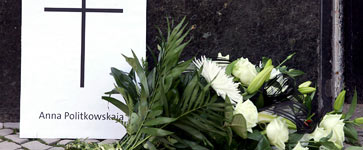
"Ich bin eine Persona non grata" - so definierte sich Anna Politkowskaja
selbst. Tausende Menschen haben in Moskau der getöteten russischen
Journalistin die letzte Ehre erwiesen.
Es ist manchmal tödlich ...
Anna Politkowskaja auf der Bühne des Akademietheaters am 11. Dezember 2005
in Wien: "Es ist manchmal tödlich, ein Informant von mir zu sein, ein
Berichterstatter, einer, der mir Informationen weitergibt. Die Menschen
bezahlen wirklich mit dem Leben; und das passiert alle zwei, drei Monate,
dass jemand verschwindet, der sagt, was er sich denkt. Heute, angesichts
ihrer Ermordung wirken diese Worte bestürzend prophetisch.
Das Gespräch auf der Bühne des Wiener Akademietheaters im vergangenen Jahr
war einer ihrer letzten öffentlichen Auftritte im Westen. Anna Politkowskaja
ging zwar davon aus, dass ihre Popularität in der Welt zugleich auch ihr
Schutzschild gegen Übergriffe und Anschläge seitens ihrer Feinde in Russland
war. Dennoch liebte sie jegliches Aufheben um ihre Person nicht. Sie machte
sich rar, war lieber in ihrem Land, um dort, wie sie es ausdrückte, "zur
Stelle und nützlich zu sein".
Bis zum letzten Tag vor der Veranstaltung war unsicher, ob sie tatsächlich
kommen werde. Dass sie tatsächlich kam, ist Gertraud Auer, der
Generalsekretärin des Bruno Kreiskyforums für Internationalen Dialog, zu
verdanken. Täglich war Gertraud Auer damals mit ihr in Kontakt und hatte so
ihr Vertrauen geworden. Noch vor wenigen Tagen, kurz vor Annas gewaltsamen
Tod, hatten die beiden über Ferien gesprochen. Anna fühlte sich matt und
wollte sich endlich einmal ausruhen.
Mit einem Augenlächeln gegen den Strom
Es fällt mir immer noch schwer, von Anna in der Vergangenheit zu sprechen.
Ihre Präsenz, ihre Stärke und ihr unprätentiöses, warmes Wesen nimmt jeden
sofort gefangen, und man glaubt, schon immer in ihrer Nähe gewesen zu sein.
Mit ihren großen dunklen Augen schaute sie einen an; ihr Blick war ganz
gerade und offen - wie der Blick von Kindern, die noch nicht gelernt haben,
sich zu verstellen und deren Vertrauen in die Welt noch nicht erschüttert
wurde. Anna hatte sich trotz aller Gefährdung und trotz all der Gräuel, die
sie recherchierte und beschrieb, bis zuletzt ihre Zuversicht und Liebe zu
den Menschen erhalten.
Sie folgte einer Mission, wenn sie so eindringlich über die Situation in
Russland sprach, über die Aussichtslosigkeit des Krieges in Tschetschenien,
die eingeschränkte Presse- und Meinungsfreiheit in ihrem Land und die
Isolation jener, die wie sie gegen den Strom schwimmen. Doch bei aller
Ernsthaftigkeit lag in ihrem Blick stets dieses besondere Augenlächeln, das
nur jenen Menschen zuteil ist, die in sich ruhen und durch und durch
authentisch sind.
Anna wirkte wie eine Kerze, die von beiden Seiten brennt. Sie war eine
Getriebene in Sachen Menschenrechte und Pressefreiheit. Sie war ein Mensch
von einer solchen - letztlich tödlichen - Konsequenz, die auch nachdenklich
darüber macht, welche Risiken wir selbst innerhalb unserer saturierten
Demokratien aufzunehmen bereit wären.
Keine Fremde in der Fremde
Anna Politkowskja war einem Traum gefolgt. Ihr Traum hieß Pressefreiheit und
Meinungsvielfalt in ihrem Land Russland. Und sie lebte diesen Traum. Trotz
Gefährdung blieb sie in ihrem Land. Sie wollte keine gefeierte Emigrantin
sein. Sie wollte trotz vielfacher Bedrohung nicht fliehen. Sie wollte keine
Fremde in der Fremde sein. Sie wollte stattdessen von zuhause über ihr
Zuhause Russland berichten. Sie wollte ihrem Land zugehörig bleiben, sie
wollte authentisch bleiben. Sie wollte sie sein! Und weil sie so war, wie
sie gewesen ist, wurde sie ermordet, hingerichtet.
"Wir in Russland sind es so gewöhnt, dass alle möglichen Menschenrechte
unter dem Titel 'Terrorbekämpfung' außer Kraft gesetzt werden, sodass das
schon niemanden mehr erstaunt. Eine der schlimmsten Folgen dieses
Außerkraftsetzens der Menschenrechte ist die Tatsache, dass der Rassismus
immer stärker wird.
Mit diesen Worten endete unser Gespräch am 11. Dezember 2005. Gemeinsam
hatten das Burgtheater, das Bruno Kreiskyforum für internationalen Dialog
und Reporter ohne Grenzen damals unter dem Titel "Warum Krieg -
Reporterinnen im Krieg" in das Wiener Akademietheater eingeladen.
Rubina Möhring ist Präsidentin von Reporter ohne Grenzen
Österreich und Vizepräsidentin von Reporters sans Frontières.
11 October 2006
Dear brothers and sisters in Christ,
I hope this email finds you in peace and health.
I am writing you from Damascus, where I am
attending the Holy Synod meetings of our Syrian Orthodox Church.. This evening,
we were shocked with very sad news from
Mousel, Iraq.
Our priest Father Boulos Iskander was killed.
His head was cut.
Three days ago he was kidnapped by a fanatic group as consequences of H.H. Pope
Benedict's recent speech. They forced the community in Mousel to write 30 large
posters denying what His Holiness had cited in respect with Mohammad, the
prophet of Islam. Although their request was done, the fanatics killed the
priest. The Bishop of Mousel H.G. Saliba Chamoun received the tragic news during
the evening session of the Holy Synod. He immediately left the meetings
returning to Mousel to be with the faithful at this very difficult time.
I wanted to share this news with you in order to convey to you the image of the hard time that Christians are facing in the region.
I kindly ask you to mention the martyr Father Boulos Iskander in your prayers.
Please include all our churches, especially in Iraq, in your prayers.
Sincerely yours,
Eustathius Matta Roham,
Archbishop of Jazirah & Euphrates
of the Syrian Orthodox Church
[fax (00 963 from the United Kingdom) 52 320817
!!! STOP
MURDERING INNOCENT PEOPLE !!!
Christian
leaders join in call for Middle East peace
Middle East
Council of Churches
Toll of a war that shames the world
Understanding the Truth of Tragic Errors
see also (in German): Christliche Verantwortung in der Welt - zu Politik und Krieg
Christian
leaders join in call for Middle East peace
Middle East
Council of Churches
!!! STOP MURDERING
INNOCENT PEOPLE
!!!
Toll of a war that shames the world
Understanding the Truth of Tragic Errors
| KOSOVO Occupation |
NICHT "NUR" GOTTLOS ... : GEGEN DIESE EU-Verfassung !!! |
Links aus:
|
|
||||
In English:
Metropolitan Kirill of Smolensk and Kaliningrad:
Bishop Hilarion
of Vienna and Austria:
LINKS
To subscribe to this bulletin:
http://www.orthodoxeurope.org/subscribe.aspx
To unsubscribe:
http://www.orthodoxeurope.org/subscribe.aspx
For correspondence in English:
info-en@orthodoxeurope.org
The web site of the Representation of the Russian Orthodox Church to the
European Institutions:
http://www.orthodoxeurope.org
The web site of the Moscow Patriarchate:
http://www.mospat.ru
|
"Joint to witness more credibly to the
Gospel" RomanCatholic Pope John Paul II and Orthodox Patriarch Bartholomew I |
| ROMAN CATHOLIC POPE "Mai più la guerra!" | RUSSIAN ORTHODOX PATRIARCH AND SYNOD |
| ORTHODOX BISHOPS OF GERMANY | INTERNATIONAL CHRISTIAN CHURCH LEADERS | ROMAN CATHOLIC BISHOPS | GREECE |
BRD: B.BARTHOLOMAIOS /
EU: B.TICHON / BEL: B.ATHENAGORAS /
USA: M.HERMAN / RUSA:
EB.LAURUS / FIN: EB.LEO
RUSEU:
M.ANTHONY /
Metropolitan Kirill of Smolensk and Kaliningrad:
Our Cooperation Is Absolutely Necessary and Is Awaited by Millions of People
Excerpts from the interview to Inside the Vatican magazine.
Inside the Vatican: On May 25, 2005 in Bari, in southern Italy, just a month after the election of Pope Benedict XVI, Cardinal Walter Kasper made a proposal that caught the attention of many observers of Catholic and Orthodox affairs: he proposed convening a type of ecumenical "council" open to the participation of Orthodox as well as Roman Catholics. He suggested that Bari could be the site of such a "council" which would have as its goal the restoration of friendship between the Catholic and Orthodox Churches, and that the creation of an "alliance" for a rediscovery of the "Christian roots of Europe" could become the council's theme. What do you think about this proposal?
Metropolitan Kirill: Cardinal Walter Kasper's idea about holding a "council" of Orthodox and Roman Catholic hierarchs in Bari is, undoubtedly, rather interesting. At the same time, it is necessary to bear in mind that a council as an ecclesiological reality is impossible in the conditions of our present division. Therefore, we may speak not about a council like ones of the Ancient Undivided Church, but about a meeting or an assembly.
I believe that, on the way to any significant event in the sphere of Orthodox-Catholic relations, it is necessary to tend to the solution of specific problems complicating these relations. A joint discussion of acute problems of the present is already under way. For instance, an International Conference on "Christian Values in Europe" organized by the Vatican's Pontifical Council for Culture along with the Moscow Patriarchate's Department of External Church Relations, which I head, will take place in Vienna in early May, 2006, with assistance from the "Pro Oriente" foundation of Vienna, Austria.
Inside the Vatican: Cardinal Kasper also said, "I am convinced that after the great efforts and significant steps made by John Paul II, Pope Benedict XVI will open the way for such a plan in the future". What do you think about Pope Benedict XVI? Have you ever spoken to him? Do you think that you could meet with him in the future? Is Benedict different from John Paul II, and if so, in what way?
Metropolitan Kirill: I respect the new Head of the Catholic Church Pope Benedict XVI very much and I had repeatedly met him before his election to the Roman throne. On April 25, 2005, the day after the inaugural celebrations, His Holiness received me in the "Santa Marta" residence where he had continued living after the end of the conclave. Our conversation was informal and warm. However, during this brief period of time we managed to discuss the basic questions in the relations between the Russian Orthodox and Catholic Churches and to note our agreement concerning the need for common action between Orthodox and Roman Catholics in upholding and proclaiming Christian values.
I was very grateful to His Holiness for this meeting and I see in it a sign of the special significance which a newly-elected pontiff attached to relations with Orthodox Churches and with the Russian Orthodox Church as the largest of them.
I would rather not compare the personalities of the two heads of the Catholic Church - the recently deceased John Paul II and the present Pope Benedict XVI. Both of them are, undoubtedly, really outstanding people. However, inter-Church relations don't always depend on individual persons, even such high-ranking ones. As is well known, there are a number of rather complicated problems that require, on the one hand, an urgent resolution or settlement, and, on the other, a responsible and thoughtful approach. Keeping both of these factors in mind should assist the overcoming of existing difficulties in the most effective way.
A major component of this important work therefore should be a fair and open dialogue between our Churches. That is why I hope for the continuation of fruitful meetings with leaders of the Catholic Church.
Inside the Vatican: What are the main difficulties in relations between the Roman Catholic and Orthodox Catholics? Which can be settled relatively easily and which cannot?
Metropolitan Kirill: Problems in relations between Russian Orthodox and Catholic Churches are well known. First of all, it is the situation in the Ukraine, especially in the western part of it, where oppressions of Orthodox believers by Greek Catholics continue. Unfortunately, in the last years the situation has not changed for the better. On the contrary, it tends to become more complicated due to the transfer of Cardinal Lubomyr Husar's see from Lvov, with which the center of the Ukrainian Uniates has been historically connected, to Kiev, called the "mother of Russian cities" and for centuries the see of the heads of the Orthodox Church of Russia, and then the Ukraine.
In Russia, our believers are seriously concerned and misunderstand missionary work done by Roman Catholic clergy among the Orthodox population, in particular among children and youth. People often ask me: why do Catholic priests not work more actively in the countries from which they come to Russia and prefer to nurture Roman Catholic traditions in Russian children from troubled families?
These problems can hardly be settled soon and easily but we should aim for their prompt solution as there are destinies of real people, their worries and feelings, behind them.
Inside the Vatican: Can you suggest any special initiatives that could improve Roman Catholic-Russian Orthodox relations? Do you support the creation of a "Catholic-Orthodox Alliance" in Europe in support of Christian moral values, as suggested by Cardinal Kasper and the Viennese and Austrian Diocesan Russian Orthodox Bishop Hilarion Alfeyev?
Metropolitan Kirill: Regarding the idea of the creation of an "Orthodox-Catholic alliance" I would like to say that it is necessary to make correct emphasis here and to agree about the terms. The concept of an "alliance" has a more political than Church-related meaning. Therefore, I would prefer not to use this expression.
However, the Russian Orthodox Church actively supports the development of interaction with the Catholic Church. We agree on a majority of the questions that the Christian world faces today. It is well known that both Churches are very concerned about the expulsion of religious values from the life of modern society and the need to preserve Christian ethical standards in it. Our cooperation is absolutely necessary. It is awaited by millions of people - believers and spiritual seekers alike. This interaction can have far-reaching consequences for Europe and, what is especially important, for the whole system of inter-Christian relations. It is absolutely clear that in this case we speak not only about the Russian Orthodox Church but about all local Orthodox Churches. I think the place of Christian values in the world will in many ways depend on the character of Orthodox-Catholic relations, at least on the European continent < >
The full text of the interview will be published in the May issue of Inside the Vatican magazine.
Bishop Hilarion of Vienna and Austria: The Need to Act
Excerpts from the interview to Inside the Vatican magazine.
Inside the Vatican: A major conference involving Catholics and Orthodox is scheduled to take place in Vienna in early May. Can you tell us something about the background of this conference, and its chief purpose?
Bishop Hilarion: The theme of the conference is "Christian Values in Europe." The initiative to organize this conference belonged to Metropolitan Kirill, chairman of the Department for External Church Relations of the Moscow Patriarchate. Invited are distinguished Church leaders and theologians from the Roman Catholic and Russian Orthodox Churches. There will be about 25 participants on each side.
The discussion on Christian values acquires special relevance and urgency in the context of the process of globalization, which is affecting more and more of the world's population. Globalization is a multi-dimensional, multi-faceted and multi-layered process. It exerts influence on the world as a whole and on separate countries and regions, on the entire human community and on concrete human beings. It affects politics and economics, morals and law, the sciences and arts, education and culture. Globalization leaves its imprint on practically all areas of human endeavor, with the possible exception of one: religion. Today only religion is systematically resisting the relentless attack of globalization, entering into an unequal battle to defend those values it considers fundamental and which are being challenged by globalization.
Only religion is able to counter the ideology of globalization with its own system of spiritual and moral orientation based on the centuries-long experience of generations acquired during the pre-globalization age. In the modern battle for values, people find themselves more often than not on opposite sides of the barricades, with those inspired by religious ideals on the one side and those whose world-view is formed by secular humanism on the other.
At the core of the modern globalization ideology is the humanistic idea of the absolute dignity of the human person and of the existence of universal, "common human" values, which are proposed as the foundation of a single world civilization. By "common human" values, however, are understood not only those spiritual and moral tenets which are common to all religions or which are equally obligatory for both religious and non-religious people ("thou shall not kill", "thou shall not steal", "thou shall not bear false witness", etc.), but also many ideas that are questionable from the religious point of view and which are rooted in liberal-humanistic morality. To this latter group belong, in particular, the affirmation of the right of each individual to his or her own way of life, which extends insofar as it does not cause harm to others. From the viewpoint of humanistic morality, the only limitatio n on human freedom is the freedom of other people: the moral person is one who does not harm the interests of others, while the immoral person is one who infringes upon their freedom. The idea of absolute moral norms as well as the notion of sin are completely absent from modern humanistic ethics < >
The potential explosiveness of today's inter-civilizational situation is to a significant degree caused by the fact that the Western liberal-humanistic ideology, acting on the idea of its own universality, is imposing itself on people who were raised in other spiritual and moral traditions and have different value systems. These people see in the total dictate of the Western ideology a threat to their identity. The evidently anti-religious character of modern liberal humanism brings about non-acceptance and rejection by those whose behaviour is religiously motivated and whose spiritual life is founded on religious experience.
The question here is not only about individuals for whom faith is a matter of personal choice, but also about entire nations, cultures and civilizations formed under the influence of religious factors. It is at the international, inter-cultural and inter-civilizational levels that the opposition between secularism and religion can grow into an open conflict. All these questions must be addressed by both the Catholics and the Orthodox during the Vienna conference on Christian values in Europe.
Inside the Vatican: Catholics and Orthodox are Christians, divided since 1054. Can that division be healed? How?
Bishop Hilarion: < > The schism of 1054 was < > the result of quite a long development, and not simply a matter of misunderstanding between the papal envoys and the members of the Church of Constantinople, as it is sometimes presented. Obviously, dogmatic and ecclesiological differences between East and West in the first millennium did not necessitate the complete breach of eucharistic relations between the two traditions, but they definitely contributed to the alienation that resulted in this breach.
The second millennium was marked by a continual struggle between East and West, and by the numerous attempts of the Pope to bring disobedient Easterners under his control.
The Crusades were the most striking and outrageous example of the use of violence against the Orthodox by their Western fellow-Christians. The memory of the Crusades is still alive among the Greeks: the wound is still bleeding. The late Pope John Paul II apologized for the Crusades before the Archbishop of Athens, which by itself was a noble action. One has to admit, however, that the apology was delayed by eight centuries. It must also be recognised that numerous remnants of the Crusaders' activity still survive, including, for example, the Latin Patriarchate of Jerusalem, which was created at the time of the Crusades in order to replace the respective Orthodox Patriarchate.
Other blows dealt repeatedly to the Orthodox were the numerous attempts to bring them under the jurisdiction of Rome by means of "union". The first such attempt, made in Lyon in the 13th century, was followed the Union of Ferrara-Florence in 1439, on the eve of the fall of the Byzantine Empire. Nothing has remained of these two "unions". But the Union of Brest, proclaimed in 1596, gave birth to ecclesiastical structures that still exist and whose recent revival has contributed to aggravating Catholic-Orthodox relations.
Parallel to these processes, a continuing theological alienation between Orthodox and Catholics also grew. This was to a significant degree conditioned by the introduction of new doctrines in the Catholic Church, which were (and are still) regarded by the Orthodox as dogmatic innovations. The belief in the infallibility of the Pope when he speaks ex cathedra is the most striking example. A teaching that was the consequence of many centuries of theological debate within the Catholic Church, it was strongly censured by the Orthodox. Indeed, this doctrine was rejected also by some traditional circles within the Western Church: hence the appearance of the Old Catholic movement, which for many decades conducted a dialogue with the Orthodox.
The struggles between the two Christian traditions in the first half of the 20th century did not differ from those of previous times in that they continued at various levels. There were, however, some latent streams within both traditions which predetermined a rather rapid rapprochement in the second half of the 20th century. Already in the 1930s and 1940s theologians from both sides began to meet on a more regular basis, and for the very first time in Christian history the possibility emerged for each to cross the borders of its own context.
The theological exchange that took place at that time contributed to the remarkable change on the part of the Catholics towards the Orthodox which was most evidently manifested during the Second Vatican Council. At this Council, the Orthodox Church was recognized as possessing the fullness of the divine grace that leads people to salvation. It is from Vatican II that the term "sister Church" with reference to the Orthodox Church stems.
This same Council predetermined the significant achievements attained by the Mixed Commission for Theological Dialogue between the Roman Catholic Church and the Orthodox Churches, which was created in 1980. The work of this Commission lasted for 20 years and then was interrupted in 2000 because of a strong disagreement on the question of Uniatism. After a five-year break the Coordinating Committee of this Commission met in the fall of 2005 in Rome to prepare the plenary session, which is to be held in Serbia in 2006.
Thus, the theological dialogue has now resumed, and it is a good sign. However, there is not much ground for excessive optimism, since the questions to be discussed are quite difficult and quite numerous. The issue of the primacy of the bishop of Rome, which will be addressed by the Commission in 2006, is among the most difficult ones, not only because it remains the main cause of disagreement between the Catholics and the Orthodox, but also because there is no unity among the Orthodox on the understanding of primacy in the Universal Church. I envisage long and difficult discussions, many years of assiduous work, and no immediate and visible results.
Inside the Vatican: If the division cannot be healed, can Catholics and Orthodox nevertheless work together on certain social problems, like caring for abandoned children, or supporting marriage and family life? What possibilities do you see for this type of collaboration?
Bishop Hilarion: I think there are many possibilities for such collaboration, and I regret that until now we have done very little together in the field of Christian charity. Sometimes our missions and charitable organizations act almost as competing structures, while we desperately need to learn to work together.
Caring for abandoned children and supporting marriage and family life are among the most urgent tasks in such countries as Russia. It is important, however, that these noble activities not be used for the aims of proselytism, which devalues them and makes them an obstacle, rather then a means for Christian unity.
I hope some way of closer collaboration of the Catholics with the Orthodox in the field of promoting and defending Christian values in Europe will be found in the near future. Over a year ago, on the pages of your periodical, I called for a European Catholic-Orthodox alliance to be created, and I still think this idea is quite relevant.
There are now two obvious essentially-differing versions of Christianity - the traditional and the liberal. The abyss that now exists divides not so much the Orthodox and Catholics, or the Catholics and Protestants, as the "traditionalists" and "liberals" (with all the conventions of such labels). Of course, there are defenders of traditional values in the Protestant camp (especially in the Southern churches, that is, Africa, Asia, Latin America). But a liberal attitude prevails among the Protestants.
In this situation, I suppose that a consolidation is needed in the efforts of those churches which consider themselves "Churches of Tradition," that is, the Orthodox, Catholics and the Oriental Orthodox. I am not speaking about the serious dogmatic and ecclesiological differences which exist between these Churches and which can be considered within the framework of bilateral dialogue. I am speaking about the need to reach an agreement between these Churches on some strategic alliance, pact or cooperation for defending traditional Christianity as such - defending it from all modern challenges, be it militant liberalism, militant atheism or militant Islam. When I expressed this idea for the first time, I used the word "alliance' to describe the body which, in my opinion, needs to be created. Some subsequent critics, while enthusiastic about the idea itself, did not like the term "alliance" for the military or political co nnotations which, allegedly, could be discerned in it.
Indeed, what matters most is not the terminology, but the idea. Perhaps we could speak about a Catholic-Orthodox Committee on Cooperation in Europe, or about a European Catholic-Orthodox Consultative Board. In any case, for the body in question, we need a word which has no ecclesiastical connotations: words like "council" or "union" should be avoided. Otherwise one may suspect that a new type of Uniatism is envisaged.
I would like to make clear that we do not need another union of the type of Ferrara-Florence, a union aimed at restoration of full Eucharistic communion but based on a theological compromise. What we do need at this stage, in my opinion, is a close and efficient strategic cooperation, for the challenge is made to traditional Christianity as such. This is especially noticeable in Europe, where de-Christianization and liberalization are occurring as persistently as the gradual and unswerving Islamization. The liberal, weakened "Christianity" of the Protestant communities cannot resist the onslaught of Islam; only staunch, traditional Christianity can stand against it, ready to defend its moral positions. In this battle, the Orthodox and Catholics could, even in the face of all the differences accumulated over the centuries, form a united front.
The primary purpose of the strategic cooperation that I propose should be the defense of traditional moral values such as the family, childbirth, spousal fidelity. These values are subjected to systematic mockery and derision in Europe by liberals and democrats of all types. Instead of spousal fidelity, "free love" is promoted, same-sex partnerships are equated with the union of marriage, childbirth is opposed by "family planning." Unfortunately, we have serious differences in these matters with most Protestants, not to speak of fundamental differences of theological and ecclesiological character < >
Inside the Vatican: Is there a specific structure you have in mind for this type of collaboration?
Bishop Hilarion: A European Catholic-Orthodox Alliance, or Committee on Cooperation, or Consultative Board, whatever name is given to the body that is proposed, should consist of the official representatives of both Catholic and Orthodox Churches. If, for example, the 25 representatives of the European Bishops' Conferences, who now constitute the COMECE (the European Catholic bishops' conference), could be joined by some 15 Orthodox bishops, representing the Orthodox Churches that have dioceses and parishes in Europe, this could become an authoritative and creative body for defending traditional Christian values in Europe. But I presume there could be some other, perhaps less ambitious structures of a smaller scale.
Whatever is the structure and whatever is its name, I am convinced that we must act speedily, since the challenges that traditional Christianity faces are numerous and are growing. We should not wait until Christianity is swallowed by Islam, or defeated by militant secularism, or crushed by consumerism and relativism prevailing in modern society. We must think very seriously about common ways of facing all these modern challenges, and I greatly hope that the Vienna conference will be just the first step on the path which we will travel together.
The full text of the interview will be published in the May issue of Inside the Vatican magazine.
NICHT "NUR"
GOTTLOS ... : ...
GEGEN DIESE EU-Verfassung !!!
NICHT "NUR" GOTTLOS ... :
GEGEN DIESE EU-Verfassung !!!
- weil sie einen
Versuch darstellt "unsere Wurzeln abzuschneiden" !!!
Anders gesehen (Günther Nenning in
KronenZeitung-Wien)
ABGESCHNITTENE WURZELN
Was bitte, brauchen die Menschen dringender:
die liebe EU-Verfassung oder den lieben Gott ?
Beides probiert, kein Vergleich !
Es wäre natürlich beides zusammen erhältlich:
Die EU-Verfassung und ein einleitender Satz, oder gar mehrere, in denen Gott
vorkommt, das Christentum, sonstige Religionen, der Humanismus, die
Menschenrechte usw. - das gehört ja alles zusammen.
Aber nein, das darf nicht sein.
Egoismus, Zynismus, Verachtung aller höheren und höchsten Dinge - sie haben sich
in den komplizierten Verhandlungen zum Verfassungstext unverhüllt gezeigt, und
nichts deutlicher als in dem geringen oder gar keinem Interesse, das die
verhandelnden Personen und Mächte gezeigt haben, als es um den Gottesbezug in
der Verfassung ging.
So wurde die EU-Verfassung ein doppelter Pfusch:
zweitens ein Kompromiss-Kauderwelsch, unverständlich für den normalen Bürger -
erstens ein (angeblich) historisches Dokument, in welchem Gott nicht vorkommen
darf.
Also der liebe Gott hält das ja leicht aus, dass er in vergänglichem Papierwerk
nicht vorkommt.
Im Übrigem ist es eine Schande und eine Entlarvung.
Da gibt es im EU-Parlament eine deutliche Mehrheit von Abgeordneten der
europäischen Volksparteien (EVP), die sich doch zum Christentum, zur
christlichen Soziallehre usw. (angeblich) bekennen.
Da gibt es quer durch alle europäischen Gruppierungen und Institutionen
vermutlich eine große Zahl von religiös Gesinnten.
Keinen hat der fehlende Gottesbezug ernsthaft aufgeregt. Alle sind voll
verstrickt und gefangen im ständigen Hin und Her ihrer sonstigen Interessen.
Gesiegt hat eine kleine, aber mächtige Zahl von praktizierenden Atheisten und
Antiklerikalen, die eisern entschlossen waren:
alles, aber Gott darf nicht herein.
Da war es wieder einmal der Papst, der klare Worte gesprochen hat. Es ist schon
so: Er ist der einzige mannhafte Politiker, den wir haben. Er sagte:
"Man schneidet nicht die Wurzeln ab, aus denen man geboren wurde."
Dazu der orthodoxe Patriarch Bartholomaios:
"Niemand, der sich mit Europa befasst, kann die christlichen Wurzeln Europas
leugnen."
Oh doch, man kann. Und so schaut dann dieses Europa auch aus.
Gewiss kommt es auf das Herz an und nicht auf das Verfassungspapier.
Aber ebenso gewiss ist: Diese EU-Verfassung trägt das Kainsmal eines Europa ohne
Gott.
Wenn der Papst fordert, Europa dürfe sich nicht die Wurzeln abschneiden - meint
er nicht nur einen historischen Tatbestand: ein Europa, das seine christlichen
Wurzeln verleugnet - er meint auch etwas sehr Aktuelles und sehr Persönliches:
Jeder Einzelne von uns, der sein Leben nur noch auf wirtschaftliche
Interessen, auf Egoismus, Fit and Fun reduziert - lebt falsch.
Ohne Wurzeln gibt es kein Glück.
e-mail: guenther.nenning@kronenzeitung.at
NICHT "NUR" GOTTLOS ... :
GEGEN DIESE
EU-Verfassung
- weil sie -gegen
jede Erfahrung der europäischen Völker- zur Konfliktlösung auf
Militarismus setzt !!!
Stellungnahme
des
Ständigen Ausschusses
der
Arbeitsgemeinschaft Christlicher Kirchen in Bayern
zum
ENTWURF einer VERFASSUNG der EU
Der Ständige Ausschuss der Arbeitsgemeinschaft Christlicher Kirchen in Bayern (AcK i.B.) hat sich bei seiner Sitzung am 12. und 13. März 2004 in Nürnberg
mit dem Entwurf für die künftige Verfassung der Europäischen Union beschäftigt.
Mit Verwunderung haben wir wahrgenommen, dass der Verfassungsentwurf eine Reihe von Aussagen zu einer europäischen Sicherheitspolitik enthält, die bisher in der Öffentlichkeit nicht diskutiert worden sind.
Im Ergebnis laufen sie darauf hinaus, dass
1. eine Verpflichtung zur militärischen Aufrüstung der EU festgeschrieben wird,
2. die Bereitschaft zu weltweiten Militäreinsätzen zur Pflicht erhoben wird,
3. die Entscheidung über den
Einsatz der künftigen EU-Soldaten den Europäischen Parlament entzogen und allein dem Ministerrat übertragen werden soll,
4. die Prävention als Grund für militärischen Eingreifen angegeben wird.
Wir haben den Eindruck, dass hier eine Verteidigungs- und Sicherheitspolitik formuliert wird, die den bisherigen Weg verlässt und Europa
zu einer militärischen Weltmacht mit enormem Interventionspotential machen will.
Der Ständige Ausschuss der Arbeitsgemeinschaft Christlicher Kirchen in Bayern protestiert gegen diese Bestrebungen und fordert dazu auf,
dass in allen unseren Mitgliedskirchen und in der Öffentlichkeit der Verfassungsentwurf in diesen Teilen zur Kenntnis genommen und abgelehnt wird.
Der Verfassungsentwurf widerspricht den Bemühungen vieler Christinnen und Christen um eine friedliche Welt und dem Friedensauftrag der
Bundesrepublik Deutschland.
Europa hat ein halbes Jahrhundert Erfahrung darin, seine Konflikte ohne den Einsatz von militärischer Gewalt zu lösen, und war darin
so erfolgreich wie nie zuvor in der Geschichte. Auf diesem Weg sollte Europa weiterschreiten.
Nürnberg, 13. März 2004
Arbeitsgemeinschaft Christlicher Kirchen in Bayern, Marsstrasse 19, 80335 MÜNCHEN
e-mail: ackbayern@yahoo.de , www.ack-bayern.de ,
Tel.: 089-54828397, Fax: 089-54828399
_________________________________________________________________________________________________________
OrthodoxCatholicDialogueZENIT04G01 1 July 2004 in Dave Parry's files
For
more information from ZENIT run http://www.zenit.org/ and see at end of
this
message.
Christian Unity Will Give Credibility to Evangelization,
Say
Pope and Patriarch
Joint Declaration at Conclusion of Patriarch Bartholomew I's
Visit to Rome
VATICAN CITY, JULY 1, 2004 (Zenit.org).- Christians must
recover their lost
unity to witness to the Gospel "in a more credible way,"
John Paul II and
Orthodox Patriarch Bartholomew I say in a joint
declaration.
The declaration, published today by the Vatican press
office, culminated the
visit of Orthodoxy's "first among equals" to Rome, on
the occasion of the
solemnity of the Apostles Sts. Peter and Paul, feast of
the Rome Diocese.
"In the face of a world suffering all kinds of
divisions and imbalances,
today's meeting is an effort to recall in a
concrete way and with force the
importance that Christians and Churches live
among themselves in peace and
harmony, to witness concordantly the message of
the Gospel in a more
credible and convincing way," the declaration
says.
"Many are the challenges to be addressed together to contribute to
the good
of society: to heal with love the wound of terrorism, to infuse a
hope of
peace, to contribute to cure so many painful conflicts; to restore to
the
European continent the awareness of its Christian roots," the two
religious
leaders continue.
In the statement, Orthodox and Catholics
in effect commit themselves "to
construct a real dialogue with Islam, because
from indifference and
reciprocal ignorance only diffidence and even hatred
can ensue."
The text reaffirms the need to "nourish the awareness of the
sacredness of
human life" and to "operate so that science will not deny the
divine spark
that every man receives with the gift of life."
The Pope
and ecumenical patriarch of Constantinople point out that the unity
of
Christians is also necessary "to collaborate so that this earth of ours
is
not disfigured and creation is able to preserve the beauty that God has
given
it."
But "above all" John Paul II and Bartholomew I indicate, it is
necessary
that Orthodox and Catholics be united "to proclaim with renewed
commitment
the evangelical message, showing contemporary man how much the
Gospel can
help him to find himself and to build a more humane
world."
As a key step to advance on the path toward full unity between
Orthodox and
Catholics, separated by an almost 1,000-year schism, both the
Bishop of Rome
and the Patriarch of Constantinople decided to relaunch the
work of the
Mixed International Commission for Theological Dialogue between
the Catholic
Church and the Orthodox Church. The commission, established in
1979, is
perceived as having lost its rhythm of work in recent
years.
The Holy Father and the patriarch acknowledge that "problems
and
misunderstandings" from the past continue, as well as "fears" that
have
arisen recently given the changes that have taken place after the fall
of
the Communist regimes in Central and Eastern Europe.
Given these
situations, the two Christian leaders repeated the advice that
St. Paul gave
to the Corinthians: "May everything be done among you
in
charity."
"The long practice of the 'dialogue of charity' comes to
our aid precisely
in these circumstances, so that the difficulties may be
addressed with
serenity and not slow down and darken the path undertaken
toward full
communion in Christ," the joint declaration
concludes.
Bartholomew I's visit served to celebrate with John Paul II
the 40th
anniversary of the historic embrace in Jerusalem between
Patriarch
Athenagoras I of Constantinople, and Pope Paul VI.
Later, on
Dec. 7, 1965, the day before the closing of the Second Vatican
Council, Paul
VI and Athenagoras I made a joint declaration deploring and
lifting the
mutual "anathemas" that gave rise to the 1054 schism between the
Churches of
the East and West.
Pope Accepts Invitation to Orthodox See
Bartholomew
I Extends Offer for Visit to Istanbul
VATICAN CITY, JULY 1, 2004
(Zenit.org).- At the end of his visit to Rome,
Patriarch Bartholomew I of
Constantinople invited John Paul II to visit the
see of the ecumenical
patriarchate, in Turkey.
The invitation was made today during a farewell
luncheon, after the
patriarch's four-day stay in Rome as the guest of the
Pope.
The Holy Father was pleased to accept the invitation to visit the
see of the
patriarchate, which is in Fanar, in Istanbul, Vatican Radio
reported.
Earlier, the two religious leaders signed a joint declaration
in which they
reaffirm their commitment to work toward the full unity of
Christians in
order to proclaim the Gospel in a "more credible and
convincing" way. They
also relaunched the work of the International Mixed
Commission for
Theological Dialogue between the Catholic Church and the
Orthodox Church.
This morning, the Greek-Orthodox community of Rome
attended the inauguration
of the liturgical use of the Church of St. Theodore
on the Palatine, at
which Bartholomew I presided. The restored church was
given to the Orthodox
as a gift by John Paul II during the Jubilee year
2000.
The ecumenical patriarch, the "first among equals" of Orthodoxy,
was
accompanied by Metropolitan Gennadios of Italy. In his address during
the
sacred liturgy, the patriarch said that on the path toward full
unity
between Catholics and Orthodox "still have a long way to go," Vatican
Radio
reported.
"Let us go forward despite so many difficulties
through the dialogue of
charity and truth," he added.
The celebration
was attended by a papal delegation which included, among
others, Cardinal
Walter Kasper, president of the Pontifical Council for
Promoting Christian
Unity; Cardinal Camillo Ruini, the Pope's vicar for
Rome; and Archbishop
Leonardo Sandri, substitute for general affairs of the
Vatican Secretariat of
State.
On Wednesday, Patriarch Bartholomew I met with the members of the
lay Commun
ity of Sant'Egidio, in the Basilica of St. Bartholomew, on the
island of the
Tiber in Rome, a church that in the year 2000 John Paul II
dedicated to the
memory of the 20th-century martyrs.
"The martyrdom of
the last century -- the century with the greatest number
of martyrs for the
faith in human history -- has become a significant
meeting place and space
for unity in prayer among Christians," a subsequent
press statement
explained, issued by the Sant'Egidio
Community.
ZE04070106
Joint Statement of Pope and Ecumenical
Patriarch
"We Have Continued the 'Dialogue of Charity'"
VATICAN CITY,
JULY 1, 2004 (Zenit.org).- Here is a translation of the Joint
Declaration
signed by John Paul II and Ecumenical Patriarch Bartholomew I
of
Constantinople and published today.
* * *
"Be watchful,
stand firm in your faith, be courageous, be strong. Let all
that you do be
done in love" (1 Corinthians 16:13-14).
1. In the spirit of faith in
Christ and of the reciprocal charity that
unites us, we thank God for the
gift of this our new meeting, which takes
place on the feast of the Holy
Apostles Peter and Paul, evidencing our firm
resolve to continue on the path
toward full communion between us in Christ.
2. Many are the positive
steps that have characterized this common path,
especially beginning with the
historical event that we recall today: the
embrace between Pope Paul VI and
Patriarch Athenagoras I in Jerusalem, on
the Mount of Olives, on January 5-6
of 1964. Today, we, their Successors,
meet again together to commemorate
worthily before God, in fidelity to the
memory and the original intentions,
that blessed meeting, now part of the
history of the Church.
3. The
embrace of our respective Predecessors of venerated memory in
Jerusalem
expressed visibly a hope present in the heart of everyone, as the
Statement
referred: "With our eyes turned to Christ, archetype and author,
with the
Father, of unity and peace, they pray to God that this meeting be
the sign
and prelude of things to come for the glory of God and the
illumination of
his faithful people. After so many centuries of silence,
they have now met
with the desire to fulfill the will of the Lord and to
proclaim the ancient
truth of his Gospel entrusted to the Church."1
4. Unity and Peace!
The hope lit by that historical meeting has illuminated
the path of these
last decades. Aware that the Christian world has been
suffering for centuries
the tragedy of separation, our Predecessors and we
ourselves have with
perseverance continued the "dialogue of charity," with
our gaze turned to
that luminous and blessed day in which it will be
possible to commune at the
same chalice of the holy Body and the precious
Blood of the Lord.2 The many
ecclesial events, which have characterized the
last forty years, have given
foundation and consistency to the commitment of
fraternal charity: a charity
that, bearing lessons of the past, will be
ready to pardon, incline to
believe more readily in the good than in the
evil, that will attempt first of
all to conform itself to the Divine
Redeemer, and to allow itself to be drawn
and transformed by Him.3
5. I thank the Lord for the exemplary gestures
of reciprocal charity, of
participation and sharing, which he has given us to
fulfill, among which it
is proper to recall the visit of the Pope to
Ecumenical Patriarch Dimitrios
in 1979, when, in the See of Fanar, the
creation of the "International Mixed
Commission for Theological Dialogue
between the Catholic Church and the
Orthodox Church in their ensemble" was
announced, a further step to support
the "dialogue of charity," the "dialogue
of truth"; the visit of Patriarch
Dimitrios to Rome in 1987; our meeting in
Rome, on the feast of Sts. Peter
and Paul in 1995, when we prayed in St.
Peter's, though separating painfully
during the celebration of the
Eucharistic Liturgy, because it was not yet
possible to drink from the same
chalice of the Lord. Then, more recently,
the meeting in Assisi for the "Day
of Prayer for Peace in the World" and the
Joint Declaration for the
Safeguarding of Creation, signed in 2002.
6. Despite our firm resolve to
continue on the path toward full communion,
it would have been unrealistic
not to expect obstacles of various kinds:
doctrinal first of all, but also
deriving from the conditioning of a
difficult history. Moreover, new problems
arose from the profound changes
that took place in the European
sociopolitical realm, which were not free
from consequences in relations
between the Christian Churches. With the
return to freedom of Christians in
Central and Eastern Europe, old fears
were reawakened, making dialogue
difficult. St. Paul's exhortation to the
Corinthians, "May everything be done
among you in charity," must still,
however, resound within and among
us.
7. The "International Mixed Commission for Theological Dialogue
between the
Catholic Church and the Orthodox Church in their ensemble," begun
with so
much hope, has marked the steps in the last years. It can still
remain as an
ideal instrument to study the ecclesiological and historical
problems, which
are at the base of our difficulties, and find possible
solutions. It is our
duty to continue in the decided commitment to reactivate
the works as soon
as possible. In recognition of the reciprocal initiatives
in this connection
of the Sees of Rome and of Constantinople, we turn to the
Lord so that he
will sustain our resolve and convince all of how
indispensable it is to
continue the "dialogue of truth."
8. Our
meeting today in Rome also enables us to address fraternally some
problems
and misunderstandings that have arisen recently. The long practice
of the
"dialogue of charity" comes to our aid precisely in these
circumstances, so
that the difficulties may be addressed with serenity and
not slow down and
darken the path undertaken toward full communion in
Christ.
9. In the
face of a world suffering all kinds of divisions and imbalances,
today's
meeting is an effort to recall in a concrete way and with force
the
importance that Christians and Churches live among themselves in peace
and
harmony, to witness concordantly the message of the Gospel in a
more
credible and convincing way.
10. In the particular context of
Europe, on the way toward higher forms of
integration and enlargement towards
the East of the Continent, let us thank
the Lord for this positive
development and express the hope that in this new
situation collaboration
between Catholics and Orthodox will grow. So many
are the challenges to be
addressed together to contribute to the good of
society: to heal with love
the wound of terrorism, to infuse a hope of
peace, to contribute to cure so
many painful conflicts; to restore to the
European continent the awareness of
its Christian roots; to construct a real
dialogue with Islam, because from
indifference and reciprocal ignorance only
diffidence and even hatred can
ensue; to nourish the awareness of the
sacredness of human life; to operate
so that science will not deny the
divine spark that every man receives with
the gift of life; to collaborate
so that this earth of ours is not disfigured
and creation is able to
preserve the beauty God has given it; but above all,
to proclaim with
renewed commitment the evangelical message, showing
contemporary man how
much the Gospel can help him to find himself and to
build a more humane
world.
11. Let us pray that the Lord give peace to
the Church and the world and
that he vivify with the wisdom of his Spirit our
path toward full communion,
"ut unum in Cristo simus."
* *
*
REFERENCES ON NEXT PAGE:-
1 Joint Statement of Pope Paul VI and of
Patriarch Athenagoras I, Agapis
Volumes, Vatican, Fanar, 1971, n. 50, p.
120.
2 See Allocution of Patriarch Athenagoras I to Pope Paul VI ,
(January 5,
1964), ibid., n. 48, p. 109.
3 See Allocution of Pope Paul
VI to Patriarch Athenagoras I, (January 6,
1964), ibid., n. 49, p.
117.
[Translation by ZENIT]
ZE04070103
John Paul II's Homily
on Solemnity of Peter and Paul
"If We Want the Unity of Christ's Disciples
."
VATICAN CITY, JULY 1, 2004 (Zenit.org).- Here is a translation of the
homily
John Paul II delivered on Tuesday, during Mass in St. Peter's Square,
on the
solemnity of the Apostles Peter and Paul. On hand was Orthodox
Ecumenical
Patriarch Bartholomew I of Constantinople.
* * *
1.
"You are the Christ, the Son of the living God" (Matthew 16:16).
Questioned
by the Lord, Peter, also in the name of the other apostles, makes
his
profession of faith.
In it is affirmed the sure foundation of our path
toward full communion. If,
in fact, we want the unity of Christ's disciples,
we must start afresh from
Christ. As with Peter, so are we asked to confess
that He is the
cornerstone, Head of the Church. In the encyclical letter "Ut
Unum Sint" I
wrote: "To believe in Christ means to desire unity; to desire
unity means to
desire the Church; to desire the Church means to desire the
communion of
grace that corresponds to the Father's plan from all eternity"
(No. 9).
2. "Ut unum sint!" From here arises our commitment to communion,
in response
to Christ's ardent desire. It is not about a vague relationship
of good
neighborliness, but about the indissoluble bond of theological faith
by
which we are destined not to separation but to communion.
That
which in the course of history has severed our bond of unity in Christ,
we
now live with sorrow. In this perspective, our meeting today is not just
a
gesture of courtesy, but a response to the Lord's command. Christ is the
Head
of the Church and we want, together, to continue to do all that is
humanly
possible to overcome what still divides us and impedes us from
communing in
the same Body and Blood of the Lord.
3. With these sentiments I wish to
express my heartfelt gratitude to you,
Holiness, for your presence and for
the reflections you proposed to us. I am
also happy to celebrate with you the
memory of Saints Peter and Paul, which
this year falls on the 40th
anniversary of the blessed meeting, which
occurred in Jerusalem on January
5-6, 1964, between Pope Paul VI and
Patriarch Athenagoras I.
Holiness,
I wish to thank you from my heart for having accepted my
invitation to make
visible and reaffirm today, with this meeting of ours,
the spirit that
animated those two singular pilgrims, who directed their
steps toward one
another, and decided to embrace for the first time,
precisely in the place
where the Church was born.
4. That meeting cannot be only a memory. It is
a challenge for us! It
indicates a path of reciprocal rediscovery and
reconciliation. A path that
is certainly not easy, or free of obstacles. In
the moving gesture of our
predecessors in Jerusalem, we can find the strength
to overcome every
misunderstanding and difficulty, to consecrate ourselves
tirelessly to this
commitment to unity.
The Church of Rome has
journeyed with a firm will and great sincerity on the
path of full
reconciliation through initiatives which have revealed
themselves, every now
and again, possible and useful. Today I wish to
express the hope that all
Christians will intensify, each on his own part,
the efforts so that the day
will hasten in which the Lord's desire will be
fully realized: "That they may
be one" (John 17:11,21). May our conscience
not reproach us for having
omitted the steps, neglected the opportunities,
and not tried all the
paths!
5. We know it well: the unity we seek is first of all a gift of
God. We are
aware, however, that the hastening of the hour of its full
realization
depends also on us, on our prayer, on our conversion to
Christ.
Holiness, as for myself, I must confess that in the search
for unity I have
always let myself be guided, as by a sure compass, by the
teaching of the
Second Vatican Council. The encyclical letter "Ut Unum Sint,"
made public a
few days before the memorable visit of Your Holiness to Rome in
1995,
reaffirmed precisely what the Council had enunciated in the decree
on
ecumenism, "Unitatis Redintegratio," of which this year is celebrated
the
40th anniversary of its promulgation.
On other occasions I have
been able to stress, in solemn circumstances, and
I request it also today,
that the commitment assumed by the Catholic Church
with the Second Vatican
Council is irrevocable. We cannot give it up!
6. The rite of the
imposition of the pallium on the new metropolitans
contributes to complete
the solemnity and joy of today's celebration, to
make it richer in spiritual
and ecclesial content.
Dear brothers, the pallium, which you will receive
today in the presence of
the ecumenical patriarch, our brother in Christ, is
a sign of the communion
that unites you in a special way to the apostolic
testimony of Peter and
Paul. It links you to the Bishop of Rome, Successor of
Peter, called to
carry out a peculiar ecclesial service in favor of the
metropolitan Churches
spread in several countries. I am pleased to accompany
you with affection
and prayer.
7. "You are the Christ, the Son of the
living God!" How many times these
words, which constitute Peter's profession
of faith, come up in my daily
prayer! In the beautiful icon given by
Patriarch Athenagoras I to Pope Paul
VI on January 5, 1964, the two Holy
Apostles, Peter the leader and Andrew
the "Protoclito," embrace in an
eloquent language of love, beneath the
glorious Christ. Andrew was the first
to place himself in the following of
the Lord, Peter was called to confirm
his brothers in the faith.
His embrace under Christ's gaze is an
invitation to continue on the path
undertaken toward the goal of unity that
together we are trying to achieve.
May no difficulty stop us. Rather, let
us go forward in hope, supported by
the intercession of the apostles and by
the maternal protection of Mary,
Mother of Christ, Son of the living
God.
[Translation by ZENIT]
ZE04070122
ZENIT is an
International News Agency.
For reprint permission, please contact infoenglish@zenit.org .
Visit our web
page at http://www.zenit.org/
To
SUBSCRIBE:
http://www.zenit.org/english/subscribe.html
SEND
US YOUR NEWS:
Please send press releases, statements and other information to
our
international news desk at:
news@zenit.org
Copyright 2004,
Innovative Media, Inc.
S.Hl. Patriarch ALEKSIJ: Statement on the tragic events in Kosovo
Kosovo-Decani: Latest News Message.List
List of Kosovo Pogrom Events March 15-20
News Update 06.04.04 Kosovo Pogrom Events March 15-20
________________________________________________________________________________
HOLY MOUNT ATHOS HILANDAR MONASTERY ON FIRE !!!
_________________________________________________________________
ANNÄHERUNG
der
RUSSISCHEN ORTHODOXEN KIRCHE AUSSER LANDES
und der
RUSSISCHEN ORTHODOXEN KIRCHE - MOSKAUER PATRIARCHAT
www.pravoslavie.ru www.russianorthodoxchurch.wsThe decision of
the Bishops' Council of the Russian Orthodox Church
on the Relations with the Russian Orthodox Church Outside of Russia, 6 October 2004Having heard and discussed the report of His Holiness Patriarch Alexy of Moscow and All Russia, the report of Metropolitan Kirill of Smolensk and Kaliningrad, Chairman of the Department for External Church Relations of the Moscow Patriarchate, and the report of Archbishop Innokenty of Korsun on the successfully developing dialogue with the Russian Orthodox Church Outside of Russia, the Bishops' Council thanked the All-Gracious Lord for the considerable improvement of relations with our brothers and unanimously resolved:
1. That the steps in the direction of overcoming divisions, which have existed in the body of the Russian Orthodox Church for decades, be considered exceptionally important;2. That satisfaction be expressed with the visits of the official delegations of the Russian Orthodox Church Outside of Russia to the Russian Orthodox Church, including the delegation headed by the first hierarch His Eminence Metropolitan Laurus, as well as with the successful common work of the Commission of the Moscow Patriarchate on Dialogue with the Russian Church Outside of Russia and the Commission of the Russian Orthodox Church Outside of Russia on Discussions with the Moscow Patriarchate;
3. That the contents of the documents prepared by the Commissions and presented to the Council for consideration be approved;
4. That after the completion of the Commissions' work and bilateral agreement of the prepared documents the Holy Synod be charged with a canonical act by which the Eucharistic communion and unity be restored on the basis of the adopted decisions.
...MORE...
Osterbotschaft 2004
S.Hl. des Patriarchen ALEKSIJ II von Moskau und der ganzen Rus´
Latest News:
His Eminence Metropolitan LAURUS is scheduled to arrive in Russia on 2004 May 14.
In addition to official meetings, His Eminence will make pilgrimages to venerate holy sites in the fatherland.
===> to official site of the Synod of Bishops of the Russian Orthodox Outside of Russia
In St. Petersburg (photoreport)
In Kursk (photoreport)
In Sofrino (photoreport)In Alapaevsk (photo-report)
In Ekaterinburg (photo-report)
Official Meetings (photo-report)
At the Kremlin (photo-report)
In Sretensky Monastery (photo-report)
In Orehovo-Borisovo (photo-report)
In Marfo-Mariinsky Convent (photo-report)
In Donskoy Monastery (photo-report)
On the Visit to Russia of the Official Delegation
of the Russian Orthodox Church Outside of Russia
May 18. 2004
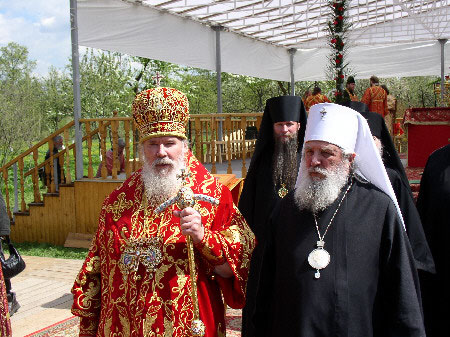
The Official Visit of His Eminence Metropolitan Laurus Continues
Arrival (photo-report)
Celebration in Butovo (photo-report)
In Sergiev Posad (photo-report)Meeting of the Delegation of ROCOR with Students and Teachers of the Moscow Theological Academy:
www.bogoslov.ruInterview with Metropolitan Laurus: Pavel Korobov, Kommersant
http://www.mospat.ru/text/e_news/id/6909.html
His Holiness Patriarch Alexy of Moscow and All Russia has received Metropolitan Laurus, Chairman of the Bishops' Synod of the Russian Church Outside Russia, on May 14, 2004, at his working residence at Chisty Pereulok. Metropolitan Laurus has arrived in Moscow for his first official visit at the invitation of the Russian Orthodox Church.
At their meeting, which was held in a warm atmosphere of mutual understanding, the Patriarch and the Metropolitan were joined by Metropolitan Clement of Kaluga and Borovsk, Chancellor of the Moscow Patriarchate, Archbishop Innocent and Archbishop Kyrill of San Francisco and Western American Diocese of the Russian Church Outside Russia.
reference to 'DECR Communication Service'
Official Site of the Russian Orthodox Church
http://www.mospat.ru
Москва 14 мая 2004 г.
http://www.pravoslavie.ru/cgi-bin/news.cgi?item=2r040514142241
Митрополит Лавр В Россию впервые в истории с официальным визитом сегодня прибыл первоиерарх Русской Православной Церкви Заграницей (РПЦЗ) митрополит Восточно-Американский и Нью-Йоркский Лавр. Он приехал по приглашению Патриарха Московского и всея Руси Алексия, переданному в Нью-Йорке лично Владимиром Путиным. Цель визита - знакомство с жизнью церкви в отечестве и встреча с предстоятелем Русской Православной Церкви и членами Священного Синода.
Митрополит Лавр (мирское имя - Василий Шкурла) родился 1 января 1928 года на территории нынешней Словакии, по национальности карпаторосс. В 1946 году переехал в США, где затем в русском Свято-Троицком монастыре в Джорданвилле принял монашеский постриг. В 1967 году он был рукоположен в сан епископа Манхэттенского. 25 октября 2001 года Архиерейским Синодом РПЦЗ избран первоиерархом с титулом митрополита Восточно-Американского и Нью-Йоркского.
reference to 'DECR Communication Service'
Official Site of the Russian Orthodox Church
http://www.mospat.ru
14.05.04
PATRIARCH ALEXY II: MAIN OBSTACLES TO CHURCH RAPPROCHEMENT ARE GONE
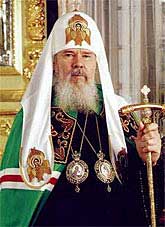
with the Russian Orthodox Church Outside Russia," he said.
continue
reference to 'DECR Communication Service'
Official Site of the Russian Orthodox Church
http://www.mospat.ru
/ 19.05.2004 / On the Visit to Russia of the Official Delegation of the Russian Orthodox Church Outside of Russia
/ 18.05.2004 / His Holiness Alexy II Lays a Foundation Stone of a Church on the Place of Mass Executions in Butovo
Above abstracts copied from:
'Department of External Church Relations - Communication Service'
Official Site of the Russian Orthodox Church
http://www.mospat.ru
DOKUMENTE in:www.pravoslavie.ru/english
DOKUMENTE aus:
www.pravoslavie.ru/english (hier: kopierte Texte)
Osterbotschaft
S.Hl. des Patriarchen ALEKSIJ II von Moskau und der ganzen Rus´
zu Veröffentlichungen beider Seiten
zu den Photos
Stellungnahme von Erzbischof MARK
Quelle des folgenden Textes:
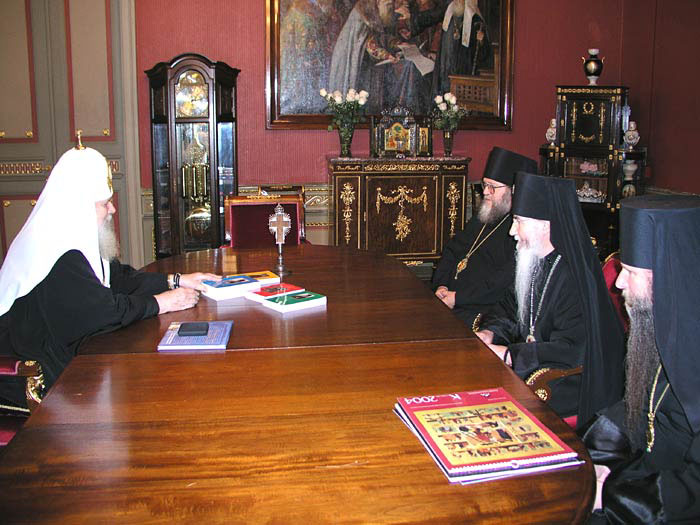
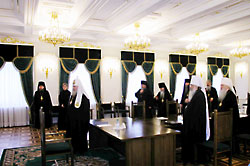
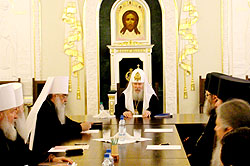
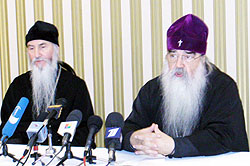
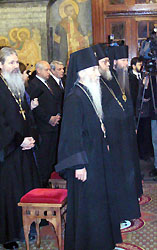
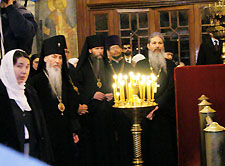
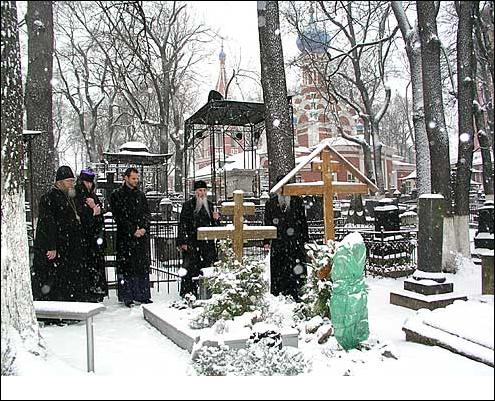
hier: un-autorisierte Übersetzung des englischen Textes aus der Veröffentlichung
LONDON / GREAT BRITAIN, 4 August 2003,
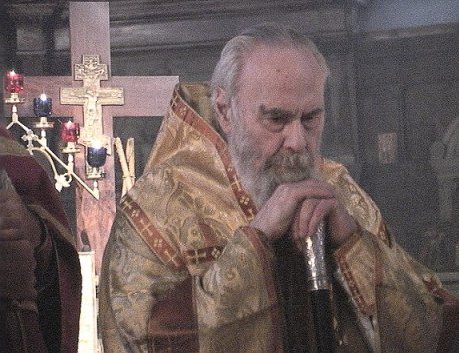
25.
Mai 2004:
KONSTANTINOPEL
-
BONN
-
KASTORIA
-
FRANKFURT
Wahl
von
Archimandrit
Bartholomaios
Kessidis
zum
Vikarbischof
der
Griechisch-Orthodoxen
Metropolie
von
Deutschland
AXIOS !
AXIOS !
AXIOS !
Die Griechisch-Orthodoxe Metropolie von Deutschland gibt bekannt, daß die heilige Synode des Ökumenischen Patriarchates den bisherigen Archimandriten Bartholomaios Kessidis, Pfarrer unserer Kirchengemeinde des hl. Propheten Elias in Frankfurt am Main, am Dienstag, dem 25. Mai, zum Vikarbischof unserer Metropolie von Deutschland gewählt und ihm den Titel der historischen Diözese von Arianz verliehen hat.
SOFIA / BULGARIA, 6 July 2003,
BRUXELLES-BRUSSEL, 22 June 2003,
Moscow, 17 March 2003,
Was
der
Papst
Bush
sagen
wird
DT
Nr.405
vom
15.05.2004
STATEMENT OF CARDINAL PIO LAGHI,
Washington D.C., United States of
America
Wednesday, 5 March 2003
I was privileged to have been sent by the Holy Father as his Special Envoy to President George Bush. I assured him of the Holy Fathers great esteem and affection for the American people and the United States of America.
The purpose of my visit was to deliver a personal message of the Holy Father to the President regarding the Iraqi crisis, to expound upon the Holy See's position and to report on the various initiatives undertaken by the Holy See to contribute to disarmament and peace in the Middle East.
Out of respect for the President and because of the importance of this moment, I am not in a position to discuss the substance of our conversation, nor am I able to release the text of the personal letter of the Holy Father to the President.
The Holy See is urging those in positions of civil authority to take fully into account all aspects of this crisis. In that regard, the Holy Sees position has been two-fold. First, the Iraqi government is obliged to fulfill completely and fully its international obligations regarding human rights and disarmament under the UN resolutions with respect for international norms. Second, these obligations and their fulfillment must continue to be pursued within the framework of the United Nations.
The Holy See maintains that there are still peaceful avenues within the context of the vast patrimony of international law and institutions which exist for that purpose. A decision regarding the use of military force can only be taken within the framework of the United Nations, but always taking into account the grave consequences of such an armed conflict: the suffering of the people of Iraq and those involved in the military operation, a further instability in the region and a new gulf between Islam and Christianity.
I want to emphasize that there is great unity on this grave matter on the part of the Holy See, the Bishops in the United States, and the Church throughout the world.
I told the President that today, on Ash Wednesday, Catholics around the world are following the Popes request to pray and fast for peace this day. The Holy Father himself continues to pray and hope that all leaders who face difficult decisions will be inspired in their search for peace.
GIOVANNI PAOLO II ANGELUS II Domenica di Quaresima, 16 marzo 2003
Carissimi Fratelli e Sorelle! 1. Si sono conclusi ieri qui, nel Palazzo Apostolico, gli Esercizi Spirituali. Sono state giornate di intenso raccoglimento e ascolto della Parola di Dio. Le meditazioni proposte avevano per tema la verità centrale della fede cristiana: "Dio è Amore". Nel silenzio della preghiera abbiamo potuto contemplare a lungo questa Buona Novella, di cui il mondo ha sempre bisogno. Di fronte allumanità segnata da gravi squilibri e tanta violenza non dobbiamo perdere la fiducia: su questo mondo si riflette, fedele e misericordioso, l'Amore di Dio, che rifulge in pienezza sul volto di Cristo. 2. Solo Cristo può rinnovare i cuori e ridare speranza ai popoli. L'odierna liturgia, presentando il misterioso evento della Trasfigurazione, ci fa sperimentare la potenza della sua luce, che vince le tenebre del dubbio e del male. In questa prospettiva di fede, desidero rinnovare un pressante appello a moltiplicare l'impegno della preghiera e della penitenza, per invocare da Cristo il dono della sua pace. Senza conversione del cuore non c'è pace. I prossimi giorni saranno decisivi per gli esiti della crisi irakena. Preghiamo, perciò, il Signore perché ispiri a tutte le Parti in causa coraggio e lungimiranza. Certo, i Responsabili politici di Baghdad hanno l'urgente dovere di collaborare pienamente con la comunità internazionale, per eliminare ogni motivo d'intervento armato. A loro è rivolto il mio pressante appello: le sorti dei loro concittadini abbiano sempre la priorità! Ma vorrei pure ricordare ai Paesi membri delle Nazioni Unite, ed in particolare a quelli che compongono il Consiglio di Sicurezza, che luso della forza rappresenta l'ultimo ricorso, dopo aver esaurito ogni altra soluzione pacifica, secondo i ben noti principi della stessa Carta dellONU. Ecco perché - di fronte alle tremende conseguenze che un'operazione militare internazionale avrebbe per le popolazioni dellIraq e per l'equilibrio dellintera regione del Medio Oriente, già tanto provata, nonché per gli estremismi che potrebbero derivarne - dico a tutti: cè ancora tempo per negoziare; c'è ancora spazio per la pace; non è mai troppo tardi per comprendersi e per continuare a trattare. Riflettere sui propri doveri, impegnarsi in fattivi negoziati non significa umiliarsi, ma lavorare con responsabilità per la pace. Inoltre, noi cristiani, siamo convinti che la pace autentica e duratura non è solo il frutto di pur necessari accordi politici e intese fra individui e popoli, ma è dono di Dio a quanti si sottomettono a Lui e accettano con umiltà e gratitudine la luce del suo Amore. 3. Proseguiamo fiduciosi, cari Fratelli e Sorelle, nell'itinerario quaresimale. Maria Santissima ci ottenga che questa Quaresima non venga ricordata come un triste tempo di guerra, ma come un periodo di coraggioso impegno per la conversione e la pace. Affidiamo questa intenzione alla speciale intercessione di San Giuseppe, del quale mercoledì prossimo celebreremo la solennità. Dopo lAngelus Saludo cordialmente a los peregrinos de lengua española, de modo particular a los fieles de las parroquias de Nuestra Señora de Araceli, San Mateo y del Centro San José, de la diócesis de Córdoba. Que esta fiesta de la Transfiguración del Señor os aliente a continuar el camino cuaresmal, annunciando a todos la conversión, la justicia y la paz. ¡Qué Dios os bendiga! Saluto i pellegrini di lingua italiana, in particolare gli adolescenti del decanato di Rho (diocesi di Milano), che si preparano alla loro professione di fede. Saluto inoltre i fedeli provenienti da Caltanissetta, San Cataldo, Mazzarino, Civitavecchia e Tarquinia, come pure il gruppo di San Biagio di Mantova, che da dieci anni realizza il Presepe Vivente. Il pellegrinaggio ai luoghi santi di Roma rafforzi in ciascuno ladesione al Vangelo e lo spirito missionario. A tutti auguro una buona domenica. Parole che il Santo Padre ha aggiunto rivolgendosi ai fedeli e ai pellegrini convenuti in Piazza San Pietro: Io appartengo a quella generazione che ha vissuto la seconda Guerra Mondiale ed è sopravvissuta. Ho il dovere di dire a tutti i giovani, a quelli più giovani di me, che non hanno avuto questesperienza: "Mai più la guerra!", come disse Paolo VI nella sua prima visita alle Nazioni Unite. Dobbiamo fare tutto il possibile! Sappiamo bene che non è possibile la pace ad ogni costo. Ma sappiamo tutti quanto è grande questa responsabilità. E quindi preghiera e penitenza!
|
Halifax Orthodox churches fasting for peace
Military Intervention in Iraq Would Be a Crime, Says Vatican Official
Church of Greece offers prayer for peace in Iraq
vor vier Jahren haben wir vor und während des NATO-Einsatzes
in Jugoslawien in eindringlichen Worten vor dem Einsatz militärischer
Gewalt gewarnt, die nicht zu einer wirklichen Lösung des Konfliktes beitragen,
sondern diesen im Gegenteil noch verschärfen und für unzählige
unschuldige Menschen Leid, Elend, Verstümmelung und Tod bedeuten würde.
Die Ereignisse haben uns recht gegeben: Um ein - vermeintliches oder wirkliches
Unrecht - zu bekämpfen, wurde neues Unrecht zugelassen, ja durch den Krieg
erst ermöglicht.
Nun scheint es so, als würde ein neuer Krieg unabsehbaren Ausmaßes
unseren Planeten bedrohen, nämlich der Angriff auf den Irak.
Sicher ist nicht zu übersehen, dass das Regime im Irak seinen Teil Schuld
an der Entwicklung trägt. Trotzdem sind wir mit der überwiegenden
Mehrheit der christlichen Kirchen in aller Welt, auch in diesem Land, der Meinung,
dass ein mit modernsten Waffen, wie sie insbesondere den USA zur Verfügung
stehen, gegen den Irak geführter Krieg gerade die treffen wird, die die
Eskalation des Konfliktes nicht zu verantworten haben, vor allem Frauen und
Kinder.
Vergessen werden sollte in diesem Zusammenhang auch nicht, dass im Irak eine
Zahl orthodoxer und orientalisch-orthodoxer Christen lebt und ihren Glauben
praktizieren kann. Für sie dürfte ein solcher Krieg im wahrsten Sinne
des Wortes existenzbedrohend werden.
Dem schon seit Jahren unter einer humanitären Katastrophe großen
Ausmaßes leidenden irakischen Volk würde im Falle eines Krieges
weiteres unermessliches Leiden und Sterben und eine politisch nicht zu kalkulierende
Zukunft bevorstehen. Die Folgen können nicht nur für den Irak, sondern
die gesamte krisenerschütterte Region des Vorderen Orients verheerend sein;
es steht zu befürchten, dass auch diesmal die Kriegsfolgen gar nicht absehbare
negative Entwicklungen begünstigen, darunter auch eine Eskalation des Terrors,
den man bekämpfen will.
In diesem Sinne hat der Papst und Patriarch von Alexandreia Petros VII. jüngst
dem Präsidenten der Vereinigten Staaten von Amerika, Georg W. Bush, geschrieben:
"Der Mittlere Osten ist ein sensitives Gebiet, das jetzt schon viel leidet.
Ein solcher Krieg würde als Angriff auf den Islam gesehen. Solch ein Eindruck,
auch wenn er falsch ist, hätte weitreichende und andauernde Konsequenzen
für die Religionen, die Gläubigen und ihren Ruf. Religionen haben
ihrem Wesen nach nichts mit Politik, mit Terrorismus und Krieg zu tun".
Diesen Worten können wir uns nur anschließen: Ein Krieg kann nicht
gerechtfertigt werden, solange es auch nur die geringste Möglichkeit zu
einer anderen Lösung der strittigen Fragen gibt. Dazu gehört auch,
dass die UN-Waffeninspekteure ihre Arbeit vollständig abschließen
können. Jede Form eines Präventivschlages, der erfolgt, bevor jede,
auch die geringste und aussichtslos erscheinende Chance zu einer friedlichen
Lösung vergeblich genutzt worden ist, aber muss verurteilt werden.
In unserer Sicht sind jedoch bei weitem nicht alle Möglichkeiten ausgenutzt
worden. Insbesondere gilt dies für internationale humanitäre Aktionen,
die das Los der irakischen Bevölkerung bessern und - so darf man hoffen
- diplomatischen Versuchen der Verständigung mit der irakischen Regierung
neue Impulse geben würden. Ein Krieg würde aber jeden Ansatz hierzu
zunichte machen.
So schließen wir uns allen an, die zum Frieden mahnen, und fordern jene,
die dies noch nicht getan haben, auf, ein Zeichen des Friedens zu setzen und
alles in ihrer Macht stehende zu tun, dass der Menschheit ein neuer Krieg erspart
bleibt, dessen Folgen für uns alle schrecklich sein können.
Unsere Gläubigen und ihre Hirten rufen wir als Orthodoxe Kirche in Deutschland,
die - wie alle Orthodoxen - in jedem Gottesdienst um den "Frieden von oben"
beten, inständig dazu auf, Gott den Allmächtigen zu bitten, dass Friede
in der ganzen Welt herrsche und Er die Führer aller Nationen und alle
Völker erleuchte, mitzubauen an einer Welt, in der die Menschen keine Gewalt
mehr gegen ihre Brüder und Schwestern anwenden, einer Welt, die das gottgegebene
Leben liebt und in Gerechtigkeit und Solidarität zusammenwächst.
Dortmund, 29. Januar 2003
Für das ökumenische Patriarchat:
+ Augoustinos, Metropolit von Deutschland, Exarch von Zentraleuropa
Für die Russische Orthodoxe Kirche:
+ Longin, Erzbischof von Klin, Ständiger Vertreter der Russischen Orthodoxen
Kirche in Deutschland
Für die Serbische Orthodoxe Kirche:
+ Konstantin, Bischof für Mitteleuropa
Für die Rumänische Orthodoxe Kirche:
+ Serafim, Metropolit von Deutschland und Zentraleuropa
Für die Bulgarische Orthodoxe Kirche:
+ Simeon, Metropolit von West- und Mitteleuropa
Avec les délégués de la Concertation d'Eglises Chrétiennes en Belgique, nous nous adressons dun même cur aux membres des communautés locales, alors que la tension grandit encore à propos de lIrak.
Chanoine D.VAN LEEUWEN, Cardinal G.DANNEELS,
Eglise anglicane Eglise catholique romaine
Métropolite PANTELEIMON, Pasteur D.VANESCOTE,
Eglise orthodoxe Eglise Protestante Unie de Belgique
Bruxelles, le 13 février 2003.
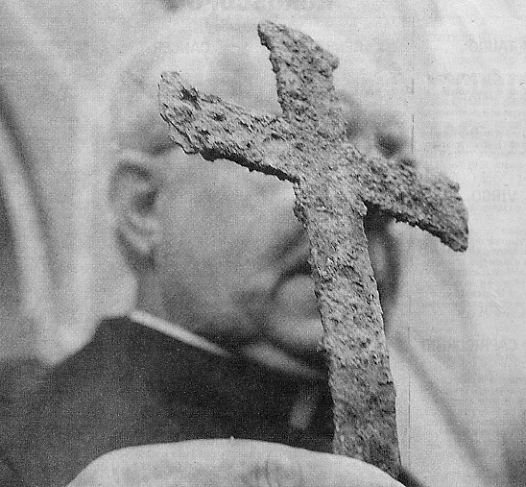
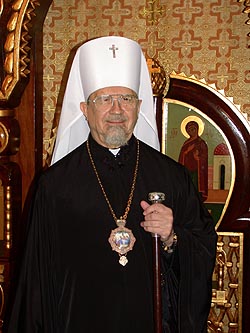
|
Metropolitan HERMAN, newly elected First Hierarch of the Orthodox Church of America Enthronement Sept. 7 and 8 th 2002 Event covered on: OCA web site: http://www.oca.org AXIOS ! AXIOS ! AXIOS ! |
 Metropolitan LEO elected Metropolitan of Helsinki and First Hierarch of the Orthodox Church of Finland
Metropolitan LEO elected Metropolitan of Helsinki and First Hierarch of the Orthodox Church of FinlandWashington, DC Site Of Enthronement of Metropolitan HERMAN, Newly Elected Primate of the Orthodox Church in America
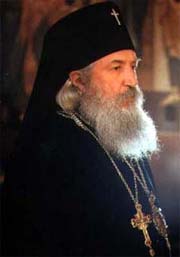 The
Most Reverend Laurus has been elected as First Hierarch of
the Russian Church Abroad.
The
Most Reverend Laurus has been elected as First Hierarch of
the Russian Church Abroad.
Statement of Metropolitan Vitaly asking for retirement
&
Act:
Election of new Metropolitan First Hierarch
ROCOR - Synod of Bishops of the
Russian Orthodox Church Outside of Russia
75 East 93rd Street
New York, NY 10128
ACT: On Wednesday, 11/24 October 2001, the day of
the commemoration of the holy Apostle Philip of the Seventy and the Venerable
Theophanes the Confessor, having assembled in the city of New York at the
Synodal Cathedral of Our Lady of the Sign, in honor of her Kursk-Root Icon,
at an open extraordinary session of our Council, praying after the Divine
Liturgy, and having served a panikhida for the ever-memorable Metropolitans
Anthony, Anastasy and Philaret and a service of supplication to the Mother
of God before her miraculous Kursk-Root Icon, and also to the holy hierarchs
Tikhon the Patriarch and John of Shanghai of San Francisco, the wonderworker,
and having invoked the gracious aid of the Holy Spirit, we, the hierarchs
of the Russian Orthodox Church Outside of Russia, proceeded to the election
of a new First Hierarch of the ROCOR, after this cathedra became vacant
on the decision of His Eminence, Metropolitan Vitaly, to go into retirement.
There were eighteen hierarchal electors, of whom six were not present
but sent in their votes in writing.
At the first ballot, the votes of Their Graces were distributed as
follows: Archbishop Laurus-12 votes; Archbishop Mark-1 vote; Archbishop
Hilarion-1 vote; Bishop Benjamin-1 vote; and three hierarchs abstained.
Thus, the Right Reverend Laurus, having received 2/3 of the votes on the
first ballot was, in accordance with the Order for the Election of the
First Hierarch, elected the fifth First Hierarch of the ROCOR.
We beseech Almighty God to send down His blessing upon the further
ministry of our First Hierarch, His Eminence Metropolitan Laurus. Amen.
ROCOR - Synod of Bishops of the Russian Orthodox Church Outside of Russia
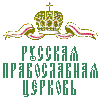
Letter of the Holy Synod of Bishops
to the Russian Orthodox Church outside of Russia
OCA - October 18, 2001
His Eminence
The Most Reverend Archbishop LAURUS
Deputy of the First Hierarch
Secretary of the Synod of Bishops
75 East 93rd Street
New York, NY 10128
To His Eminence, the Most Reverend LAURUS,
Deputy of the First Hierarch, and the Most Reverend Archpastors of the
Bishops' Council of the Russian Orthodox Church Outside of Russia:
The Holy Synod
of Bishops of the Orthodox Church in America, meeting at Oyster Bay Cove,
New York, on October 18, 2001, prayerfully reflected on your approaching
meeting, on the message which has been addressed to you by His Holiness
Patriarch ALEKSEY II of Moscow and the Holy Synod of the Church of Russia,
and on the life and mission of the Holy Orthodox Church in America, in
Russia, and around the world.
We have left
behind the twentieth century, with its rebellion against God, its wars
and violence, its millions of refugees, its technological successes and
moral failures. In the midst of the evil and sin and darkness of the last
century, the light of Christ shines brightly for us in the countless martyrs
and confessors of Russia and other lands. And the light of Christ overcame
the darkness - this is the meaning of the collapse of communist totalitarian
atheism.
We have entered the twenty-first century, and already see violence
and war, drought and famine, the reality and threat of terrorism and terrorist
use of biological and chemical warfare. Humanity is living with fear and
anxiety. Many millions live in poverty and hunger. In Western civilization
as a whole, materialism and the practical atheism which accompanies materialism
influence all of popular culture. Sadly, in Russia and other formerly communist
nations the Gospel of Christ is also powerfully challenged by materialism,
immorality, corruption, and false spiritualities and religions.
One of the
legacies of the last century in the Orthodox Church is the legacy of schism
and division. As a result, Orthodox Christians are unable to partake together
of the one Cup. We join His Holiness Patriarch ALEKSEY II of Moscow, and
many of you as well as many of your flock, in grieving at the schisms which
separate us. We join in
the movement of mutual repentance. We believe that God calls us to
unity in His truth and in His Church, and that this unity is required if
the Orthodox voice calling all to repentance and reconciliation will be
fully heard by a wounded, fearful, and suffering humanity.
We are moved
by the fact that the letter to you of His Holiness Patriarch ALEKSEY II
of Moscow is signed on the Day of the Glorification of St. Innocent, Metropolitan
of Moscow. We see in this a sign for you and for us in America. St. Innocent,
who at the end of his life was Metropolitan of Moscow, gave most of his
life to the missionary vocation of the Russian Orthodox Church. As a true
apostle he preached the Gospel of Christ to the Alaskan natives and to
the
indigenous peoples of Siberia. For him, the life in Christ was not
limited to the boundaries of his nation and his people. Rather, for him,
the life in Christ was most fully lived when it was shared humbly and joyfully
with other nations and peoples.
Although the
mission of the Orthodox Church in America is directed especially to the
peoples of North America, our eucharistic communion with the Church of
Russia and the other Orthodox Churches is a bond of peace and unity, giving
testimony to the universality of the Orthodox faith. We value both our
eucharistic communion with the Russian Orthodox Church and the gift of
autocephaly from the Russian Orthodox Church. We see in this eucharistic
communion and in our mission to America our faithfulness to the vision
and apostolic labors of St. Innocent of Moscow.
Although the center of your spiritual attention as the Russian Orthodox
Church Abroad is the witness of the Russian Orthodox Church, there are
many in your midst in America who are not Russian but American, and who
came to Holy Orthodoxy as converts. You, too, give expression to the inheritance
of St. Innocent of Moscow.
Finally, both
you and we, together with the Church of Russia, remember with love St.
Tikhon, Patriarch and Confessor of Moscow. St. Tikhon, like St. Innocent,
ended his life as the first hierarch of the Church of Russia, but began
his apostolic and archpastoral ministry in North America. It was St. Tikhon
who first proposed the need for an autocephalous Orthodox Church in America,
composed of different ethnic groups and nationalities united in one Orthodox
Church on this continent.
We are surely
called to unity, both in the universal Orthodox Church, and in America
- eucharistic unity, unity in the preachhing of the Gospel, unity in mutual
repentance and reconciliation. May our calling to unity put us all on the
path which will lead us towards an end to schism and alienation.
With brotherly love in Christ,
+THEODOSIUS
Archbishop of Washington
Metropolitan of All America and Canada
And the members of the Holy Synod of Bishops of the Orthodox Church in America:
+KYRILL
Archbishop of Pittsburgh and Western Pennsylvania
+PETER
Archbishop of New York and New Jersey
+DMITRI
Archbishop of Dallas and the South
+HERMAN
Archbishop of Philadelphia and Eastern Pennsylvania
+NATHANIEL
Archbishop of Detroit and the Romanian Episcopate
+JOB
Bishop of Chicago and the Midwest
+TIKHON
Bishop of San Francisco and the West
+SERAPHIM
Bishop of Ottawa and Canada
+NIKOLAI
Bishop of Baltimore
Moscow Patriarchate approaches rival Russian Church
RRN - SYNOD CALLS FOR UNIFICATION OF ORTHODOX
Foreign church ignores summons - by Pavel Korobov - Kommersant-Daily, 8 October 2001
On Saturday in Moscow in the patriarchal residence on Chisty Lane was held a session of the Holy Synod of the
Russian Orthodox church under the chairmanship of His Holiness Patriarch Alexis II of Moscow and all-Run. The
synod called the Russian Orthodox Church Outside Russia (ROCOR) to liquidate the schism and be united.
The Holy Synod awarded the patriarch the order of the Holy Prelate Macarius, first degree, on the occasion of the
fortieth anniversary of his episcopal ordination. It decided to add to the assembly of new Russian martyrs of the
twentieth century names from lists presented by the Moscow, Nizhny Novgorod, Saransk, Syktyvkarsk, and Yaroslavl
dioceses. It elevated the Tyla ecclesiastical school to rank of seminary and blessed opening for new cloisters, two for
men, in Vladivostok and Stavropol dioceses, and two for women, in Blagoveshchensk and Tula dioceses, and it settled
several personnel questions.
The chief act of the Holy Synod was the sending of a fraternal epistle to members of the bishops' council of the Russian
Orthodox Church Outside Russia. This council is scheduled for 23 October 2001 and at it a new head of the foreign
church will be elected to replace ninety-two-year-old Metropolitan Vitaly, who will retire.
The letter to ROCOR says that "now all the historic causes that conditioned our separation from you have disappeared.
The church now performs its saving ministry in the fatherland freely." The social doctrine of the Russian Orthodox
church that was adopted last year "introduced needed clarification in the mutual relations of the church with the state."
The synod proposed now to take the practical steps and to create a commission on matters of the unity of the Russian
church, inasmuch as "it is now time for us all to understand that our division bears witness only to inertia and human
sinfulness."
At the time that this issue was going to press, the authorized representative for Russian affairs of the ROCOR synod,
Bishop Mikhail of Toronto, was serving the liturgy and was unavailable for comment. Deacon Nikolai Savchenko,
secretary of the St. Petersburg deanery of ROCOR, commented on the RPTs' synod's call for unification as follows:
"The only thing that prevents our unification are the diseases that the Moscow patriarchate caught during the soviet
period: ecumenism and sergianism (ROCOR thinks that the caretaker of the patriarchate, Metropolitan Sergius,
supported the actions of the atheist soviet regime--KD). It is necessary to repent before the Russian people and they
people should see that healing is taking place."
The ruling bishop of the Ishimsko-Siberian ROCOR diocese, Bishop Evtikhy, said that the fact of a friendly appeal
gives him joy, but "the central phrase of the letter had a demoralizing effect" upon him personally, which spoke of the
absence of historical reasons for the division of the two churches. "Probably a majority of members of our council will
have a different assessment of history and the contemporary situation in the Russian church and in society," Bishop
Evtikhy declared to Kommersant-Daily. "For this reason it is premature to say that now there must be an immediate
unification of the churches."
Thursday morning (25 October 2001)
After graduating from the seminary, the future metropolitan was ordained a deacon and then a priest in 1973 by Metropolitan John of Helsinki. From the year 1973, he worked as a priest and teacher of religion, first in Eastern part of Finland, and from 1974 until 1979 he continued similar work in the South-Western part of Finland. In 1979 he was elected assistant Bishop of Joensuu in 1979 and his consecration took place in February. Already in October he was elected Metropolitan of the Diocese of Oulu. This diocese covers the area of Northern Finland and Lapland. At the beginning of 1980 he was appointed to this office. H.E. metropolitan Leo held this office until 1996 when he was elected metropolitan of Helsinki.
Metropolitan Leo has had many positions of trust in his carrier. Since 1975, he has been a member of the General Assembly of the Church, which among other works drafts new laws and statutes for the Church and elects bishops. He has been a member of the Administrative council of the Church since 1980. This body runs the everyday practical administration within the whole church in co-operation with the diocesan episcopal offices. From 1979 until 1993 H.E. Metropolitan Leo was the chairman of the Fellowship of SS. Sergius and Herman, which is the home mission organisation of the Church. He has also been the chairman of the committee responsible of developing the domestic ecclesiastical administration during 1996-2001. He has also been a member of the Ecumenical Council of Finland since 1980 and 1987-90 he acted as a vice-president and as a board member of the council.
Metropolitan Leo has represented the Orthodox Church of Finland on various official visits abroad.
Metropolitan Leo has been a member of the editorial councils of many publications and he has published lectures and articles on and different magazines and electronic publications.
Terrorists Demolished More Than
30 Churches And Monasteries
http://www.realitymacedonia.org.mk/web/news_page.asp?nid=678
Web posted: October 16, 2001 - Source: MIA
Tetovo, October 16 (MIA) - According to the information [service] of
the Tetovo Archpriest department [deanery], more than 30 churches and monasteries
are demolished by the Albanian terrorists in Tetovo crisis region, reads
the report which has been announced Tuesday by the eparchy administrator
Mirko Stankoski.
The report has been already sent to the Macedonian Government, Ministry
of Culture, the OSCE and the EU Monitoring Missions in the country.
The report especially reads the total destruction of the monastery
church "St. Atanasij" in Lesok and robbing of the conachs [monastic cells]
in the monastery. The tombstone of the famous Macedonian educator and prior
Kiril Pejcinovic - Tetoec and his memorial statue in Tearce has been destroyed.
Albanian terrorists have burnt the church "St. Nikola" in the village of
Slatina, the church "St. Atanasij" has been destroyed on Lesok - Brezno
road, and icons, church and religious books and documents have been robbed
and destroyed in the churches "St. Bogorodica" in Lesok, "St. Gjorgjija"
in Mala Recica, "St. Atanasij" in Tetovo Kale, "St. Ilija" and "St. Gjorgjij"
in Neprosteno, "St. Gorgjij" in Otunje, "St. Kuzman and Damjan" in Jedoarce,
"St. Petka" in Varvara, "Uspenie na Bogorodica" and "Sveto Blagovestie"
in Jelosnik, "St. Gjorgjija" in Lavce, "St. Nikola" and "St. Bogorodica"
in Tetovo.
The number of the demolished and desecrated Christian temples is not
final because some of the churches and monasteries are not accessible due
to security reasons. jb/sk/14:31.
Majority of Russians want pope
to visit
RRN
- Apostolic Administrator Says Alexy II Softening His Opposition
Zenit.org, 18 October 2001 - Archbishop Tadeusz
Kondrusiewicz, apostolic administrator in European Russia, told the
magazine Inside the Vatican that he is certain John Paul II will
travel to Russia next year.
The archbishop, whose see is in Moscow, said:
"Even the Russian Orthodox patriarch, Alexy II, does not exclude
a meeting with the Pope, though the patriarch sets some conditions
which must be met beforehand."
A trip to Russia seems more likely, following
John Paul II's pastoral visits to Ukraine last June and to Kazakhstan
and Armenia last month, according to the English-language magazine.
Russian polls reveal that nearly 60% of all Russians
favor a papal visit, up 10% since before the Pope's trip to Kazakhstan.
Archbishop Kondrusiewicz added: "I believe Alexy
II's opposition to the visit is softening more and more. One year
ago, we did not believe the Pope could even go to Ukraine or Kazakhstan.
What has just happened is already a sort of miracle in our times."
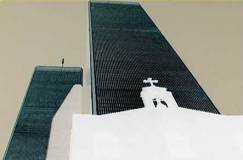
Russian church urges the world to counter terrorism by political means
Annoucement of Bishop Mercurius, Administrator of the Patriarchal Parishes in the USA - Patriarchate of Moscow
German Orthodox HOLY TRINITY Monastery prays for victims
forwarded by daveparry@cix.co.uk
VISIT of OECUMENICAL PATRIARCH BARTHOLOMAIOS in BULGARIA:
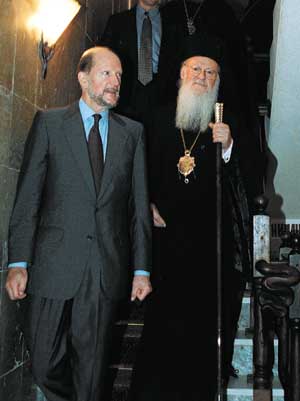

PLOVDIV, 2001 SEPT 05
The Patriarch of Constantinopel BARTHOLOMAIOS is attending the Scientific Conference 'The Byzantine cultural heritage in the Balkans' which is held from Sept. 5 - 8 in the city of Plovdiv, Bulgaria.
His Allholyness was welcomed by Bulgarian Patriarch MAKSIM, Metropolitan ARSENIJ of Plovdiv and the Roman-Catholic Bishop Georgi Yovchev.
In Plovdiv Oecumenical Patriarch Bartholomew received a letter of greetings to the conference from Pope John Paul II :
'Today we should recall the Mission of the Holy Brothers Cyril and Methodius which is inseparable from Europe's cultural heritage,' the Pope writes. In the letter he calls for 'another evangelization of Europe', in order that it may return to its Christian roots. The address of Pope John Paul II was interpreted as a token of thawing relations between the Vatican and the eastern Orthodoxy.
In his speech the Oecumenical Patriarch Bartholomew stressed that today too, the Byzantine civilization should be an example of a peaceful co-existence in the Balkans and tolerance between the religions.
'In this way we could spare our troubled peninsula many of its present problems,' he pointed out.
After the opening of the conference Patriarch Bartholomew, Patriarch Maxim and Monsignor Georgi Yovchev prayed in the Plovdiv cathedral of Our Mostholy Mother of God for Bulgaria's well-being.
PLANNED VISIT of POPE JOHN-PAUL II:
JOHN PAUL II PLANS TO VISIT BULGARIA
IN 2002
ROME, AUG. 26, 2001 (Zenit.org).
John Paul II might visit Bulgaria next May, the country´s apostolic nuncio
said.
"The Holy Father will probably come in May, but the Vatican has not
yet confirmed it officially," said Archbishop Antonio Menini, following
a meeting in Sofia, the capital, with Bulgarian Foreign Minister Solomon
Passi on Wednesday. The Foreign Minister said that "the new Bulgarian government
supports the visit and will make the
greatest efforts" to receive the Pope.
BULGARIA - ROME 2001 03 15:
METROPOLITAN NEOPHYT of DOROSTOL-CERVEN speeks on position of ORTHODOX CHURCH of BULGARIA to INVITING the POPE to VISIT BULGARIA
On March 15 2001 Metropolitan NEOPHYT of Dorostol-Cerven spoke to bulgarian newspapers of his proposal to the formal position of the Bulgarian Orthodox Church to a visit of Pope JOHN PAUL II to Bulgaria. According to Metropolitan NEOPHYT
the program for this visit should be prepared by a joint commision of the
Bulgarian Orthodox Church and the Catholic Church "working synchronized
with the Bulgarian Government to give a good example of the hospitality of the Bulgarian
People and the Bulgarian Church".
When bulgarian statesmen of the past governments visited the Vatican in recent years and pronounced the usual invitations, Pope JOHN PAUL II had always responded positively, but also pointed out that an invitation by the Bulgarian Orthodox Church would be necessary as well.
Recently a visit to Sofia by Bishop Dr. JOSEF HOMEYER of Hildesheim (Germany)
organized by Monsignore Dr. NIKOLAUS WYRWOLL of the Catholic Institute for Eastern Churches in Regensburg encountered a favorable atmosphere for bilateral talks among the two churches.
For the Roman Catholic Church Bulgaria is linked to the commemoration of later Pope JOHN XXIII who had witnessed Orthodoxy during his years as Nuntius in Sofia. Primarily the Head of the Roman Catholic Church will see it as a pastoral visit to Bulgaria´s catholics organized since 1994 in 3 dioceses. (1 of byzantine and 2 of western Rite)
2 % of the bulgarian christians are catholics (approx. 90 % of western rite / 10 % of byzanine rite). Recently growing over 2 % are considered protestants (over 12 different registered denominations).
96 % of the Christians still are members of Bulgaria´s traditional Orthodox Church.
Alltogether christians today represent over 80 % of the Bulgarians.
PATRIARCH BARTHOLOMAIOS of CONSTANTINOPLE CALLS ON BULGARIANS:
"Be Open for Papal Visit"
"Reconciliation with the Catholic Church does not mean a decline in Orthodox dogmas."
copied from http://www.zenit.org/
SOFIA, Bulgaria, SEPT. 11, 2001 (Zenit.org):
Bulgarians should receive John
Paul II "without prejudice" if, as proposed, he visits the country next
year, said Bartholomew I, the Orthodox ecumenical patriarch of
Constantinople.
"How the Pope is welcomed will depend on the spiritual strength of members
of the local Church, but a respectful conduct without prejudice is certainly
the best," Bartholomew told Bulgaria's daily, "Troud", late last
week.
Apostolic Nuncio Antonio Menini said last month that the Pope might visit
Bulgaria next May, but the Vatican has not officially decided on the trip.
"If the faith of Bulgaria's Orthodox community is strong, then we have
nothing to be afraid of, whether it is the Pope or anyone else who is not
Orthodox," said Patriarch Bartholomew. "Reconciliation with the Catholic
Church does not mean a decline in Orthodox dogmas."
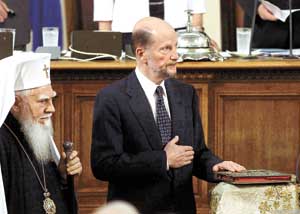

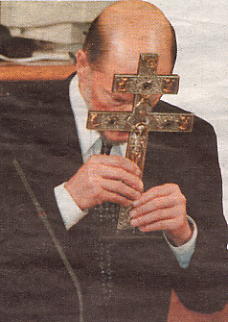
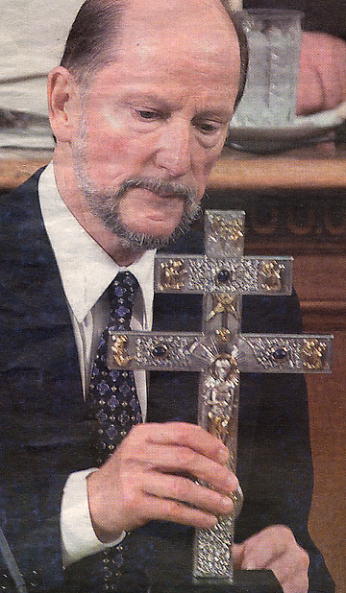
BULGARIA:
On SUNDAY´S Prime Minister SIMEON
regularly attends
CHURCH SERVICE
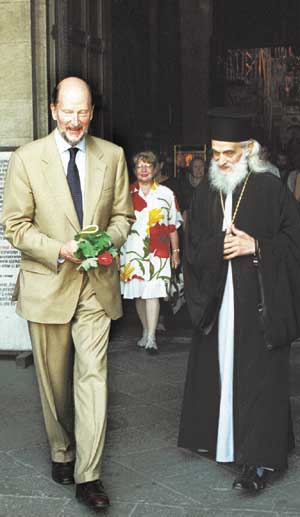
The newly elected Prime Minister of Bulgaria SIMEON SAKSKOBURGGOTSKI (Zar
SIMEON II. of Bulgaria - from the royal house of Saxony-Coburg and Gotha) is
giving another example of christian normality.
It is only natural for him to attend church service on sunday and on church
feast days. Now being the prime minister of the country and living in the capital
city Sofia he will thereby set standards for society.
When he last sunday attended church service in the cathedral this fact was
judged important enough for the most prestigous daily newspaper of Bulgaria to
publish an illustrated article.
Though in the St. Alexander Nevski Cathedral there is a representative place
for the tsar, where Simeon´s ancestors have attended service, the former tsar
now serving as prime minister was humble enough standing among the faithful for
the whole service, thereby creating a safety problem for his guards, who now
have become regular church goers themselves.
The second surprise for the public became visible, when polite church clergy at
the time of the creed thought it necessary to bring the text to the prime
minister. As the newspaper writes Simeon allready had pulled the text out of
the pocket of his jacket and was most naturally reading it with all the other
faithfull.
After he left the church with the serving patriarchal vicar bishop and renowned
church poet and author HILARION the crowd and journalists wanted Prime Minister
Simeon to adress the people. He did not give the political speach they
expected, but only explained that he was now on his way home to have lunch with
the family. Then he apologized to the bishop that despite the sunday he will
have to work in the afternoon to go through the 150 papers of the candidates
for vice ministers and provincial governors to give the country a working
government as soon as possible.

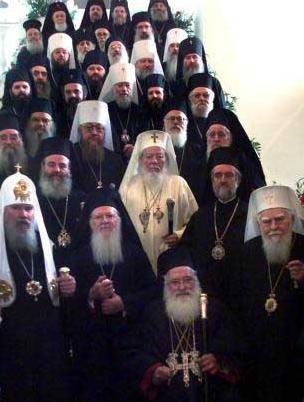
United in Faith, Prayer and Divine Service World-Orthodoxy consists of local churches as parts of the mystical body of Christ, with Christ as their only Lord and Master.
Their "Presiding Bishops" titled as Patriarchs, Archbishops or Metropolitans lead totally independently elected church administrations.
For consultations and coordination they may be called in for Holy Counsels by the Oecumenical Patriarch of Constantinople, who will preside as First among Equals.
in similar liturgical tradition but because of differences in interpretation of dogma not afiliated is the family of the "Old Oriental Churches"
(in brackets)
Patriarchate of Alexandria: 15.000
Patriarchate of Antiochia: 500.000 (mainly in worlwide diaspora: e.g. 250.000 in USA)
Patriarchate of Jerusalem: 300.000
Russian Orthodox Church - Patriarchate of Moscow: 120 Mio.
Russian Orthodox Church - Outside Russia: 1, 5 Mio.
Serbian Orthodox Church: 11 Mio.
Roumanian Orthodox Church: 18 Mio.
Bulgarian Orthodox Church: 7 Mio.
Greek Orthodox Church: 9, 5 Mio.
(Coptic and Ethiopian Church: 37 Mio.)
Orthodox Church of Georgia - Patriarchate of Tbilissi: 2, 5 Mio.
(Armenian Apostolic Church: 2, 5 Mio.)
(Syrian Orthodox Church, also present in India: 1, 6 Mio.)
Orthodox Church of Cyprus: 600.000
andOrthodox Churches of:
Albania: 500.000
Polonia: 900.000
America: 100.000
Finland: 60.000
Czech. Lands and Slowakia: 80.000
Japan: 30.000
...
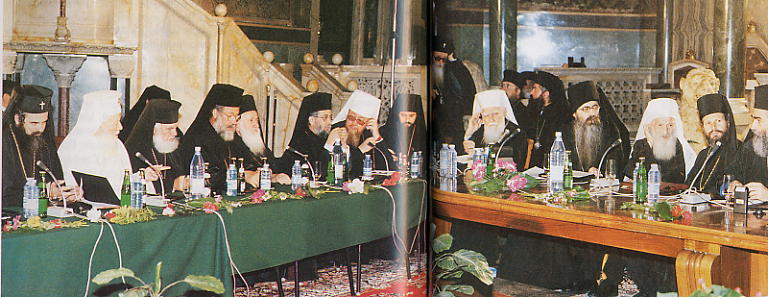
(german: Archiv: Nachrichten aus 1999 und davor
